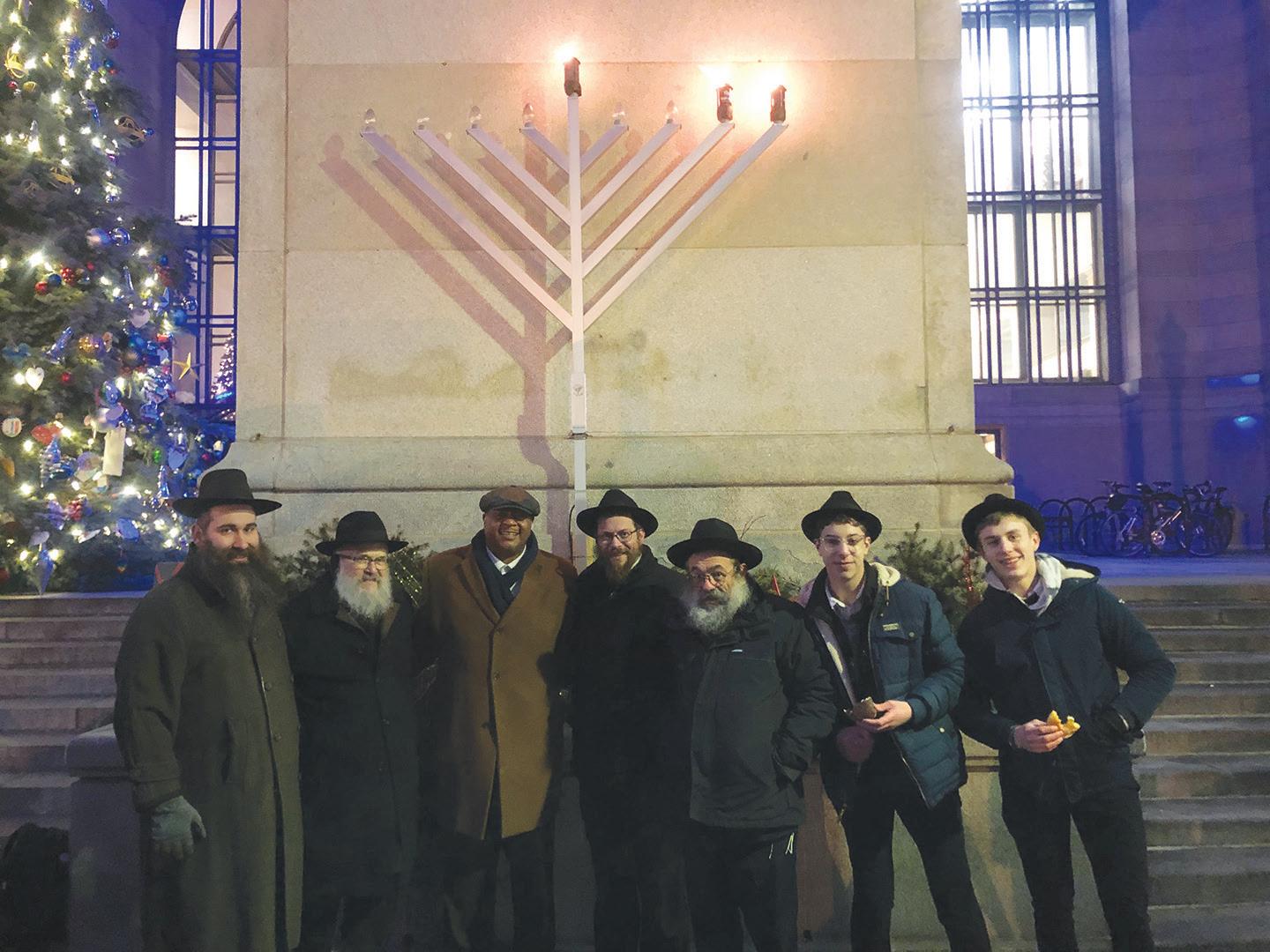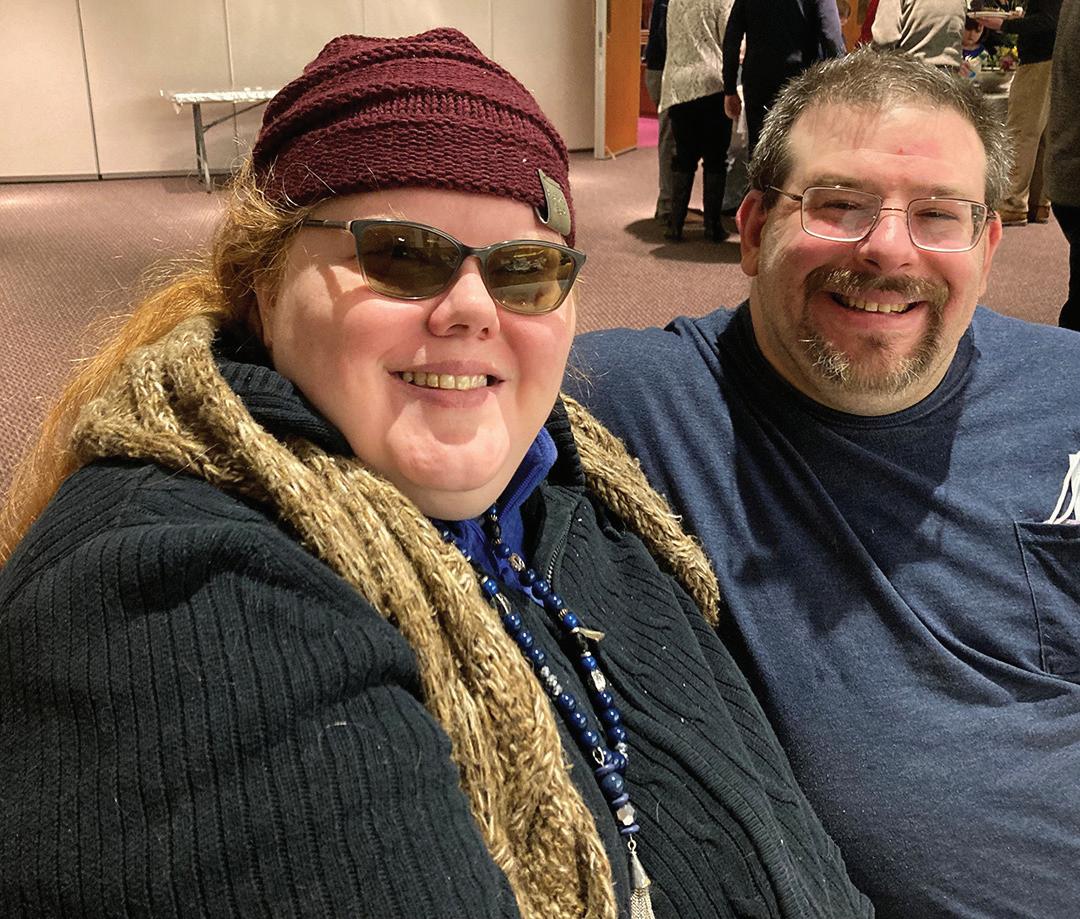New Rauh website provides virtual archive of Oct. 27



Eric Lidji was facing a challenge.
As director of the Rauh Jewish History Program and Archives at the Senator John Heinz History Center, Lidji began collecting objects related to the Oct. 27 attack at the Tree of building almost immediately after it occurred.

The Rauh had never done large-scale realtime collecting, he explained. Typically, the materials archived by an organization like the Rauh are items people are done with.
“When it’s real-time, they’re not,” he said.
That created tension in the community, Lidji said. Everyone agreed that items related to the attack should be preserved for history — but not everyone was ready to have them moved behind closed doors. For some community members, many of the items were useful in the healing process.
“Very quickly, we felt like digitization was the solution,” Lidji said.


That led to the creation of a website — october27archive.org — which Lidji said will create a comprehensive record of the material collected relating to the antisemitic attack. It will be accessible to the general public, academics, historians and researchers.
The site contains numerous “doors,” or points of access, allowing people to retrieve information in several different ways, Lidji said.
“One of those doors is a map for people who find that that’s the way they make the
most sense of data,” he added. “You can see where materials have come from.”

Users will have the ability to dig into the archive either as a whole or through filters to burrow into specific information.
A third way to access information is through what the Rauh is calling the “Community Page,” which lays out information in concentric circles. Those circles will allow users to view isolated information about particular organizations concerning Oct. 27, such as the Jewish Federation of Greater Pittsburgh or the Jewish Community Center of Greater Pittsburgh.
“Starting with a memorial to the 11 victims, then histories of the three congregations, then material that came from Jewish organizations and then materials that came from the rest of the world,” Lidji said.
The website includes technological innovations, as well.
In previous generations, Lidji explained, archives would collect newspapers. The new website can do something similar; however, since most news is now covered online, the website uses a tool called Archive It to embed news sites and stories related to the attack.
There are more than 1,000 news articles available, but the Rauh will add more. The entire website will slowly expand over time, adding more news stories, artifacts and other relevant data.

“Call
By David Rullo | Sta Writer
Two local rabbis and one cantor have joined more than 300 Jewish clergy from across the country in signing an open letter titled “A Call to Action for Clergy in Protest of Israeli Government Extremists.”


The letter is a reaction to the new Israel coalition government formed by Prime Minister Benjamin Netanyahu, his Likud Party, and the far-right Religious Zionist and Otzma Yehudit parties.
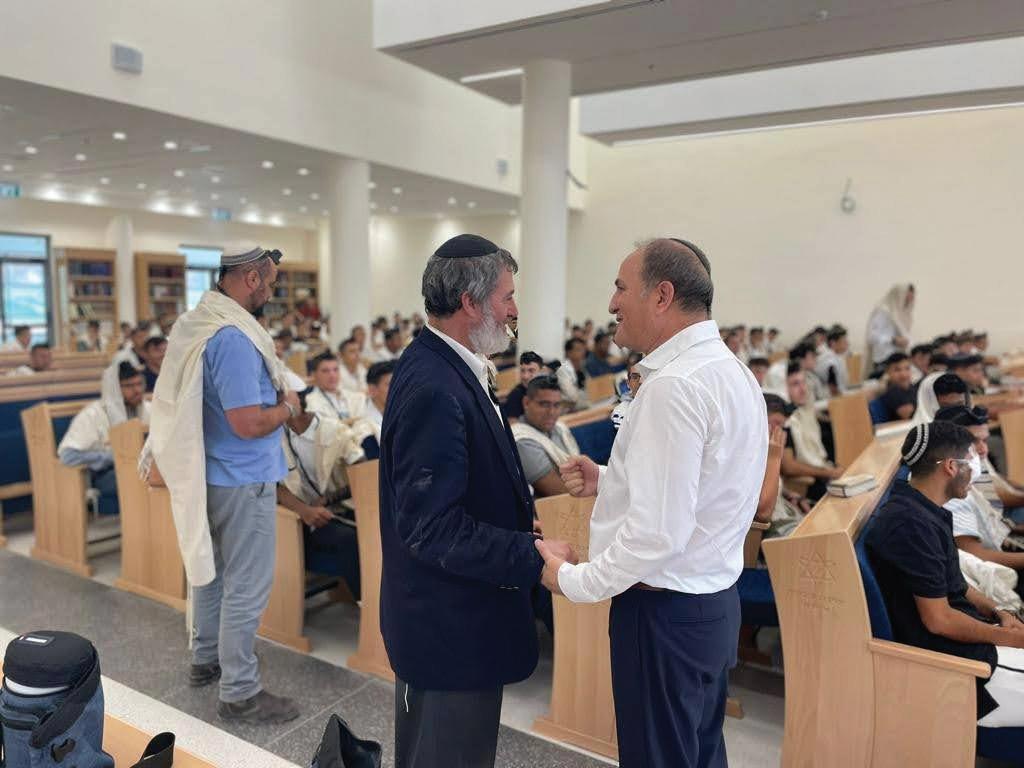
“Their policy proposals are anathema to the tenets of democracy, contradicting the spirit and intent of Israel’s own Declaration of Independence,” the letter states.
It further asserts the policy proposals will cause “irreparable harm to the Israel-Jewish Diaspora relationship” and is an “affront to the vast majority of American Jews” and their values.
The letter cites five specific concerns:
• Changing the Law of Return, including the refusal to recognize non-Orthodox converts and their descendants
• Eroding LGBTQ rights and the
Quality news
Award-winning news
Objective news
News you can trust
News no one else has
News that connects the entire Pittsburgh Jewish community

Good news and bad news
Happy news and sad news
Local news
National news
Israel news
World news
People news — machers and everyone else
Organization news — big and small
Breaking news
Trends and analysis
Series of news articles on special topics
News about the Orthodox, Conservative, Reform, Reconstructionist, new movements and the unaffiliated
News about the political left, the right and everything in between
News about the old, the young and everyone in between
Features — culture, food, health, history, travel, sports and more
Calendar of events
Information you need to know
Opinions
Letters to the editor
Polls
Life cycle events — births, b’nai mitzvah, graduations, engagements, weddings and anniversaries

Obituaries
2022 may be over, but it’s not too late to help celebrate the Chronicle’s 60th anniversary and to show your support for the Chronicle in 2023. In these tough times, we value and need your support more than ever. Here’s a sample of what we’ve been publishing since 1962: To make a donation, please scan this QR code or use the form below.

Four months after making aliyah: Checking in with Rabbi Daniel Wasserman
— LOCAL —
 A
A
The former spiritual leader of Shaare Torah Congregation in Squirrel Hill made aliyah to the Jewish state on Aug. 31, 2022, 11 years to the day since his first child, his daughter, immigrated to Israel. Today, he is leading services for a small group of Moroccan Jews, considering training as an EMT and addressing how 25 years of 24/7 rabbinic service took a toll on his voice.
“I’m working with someone to repair my voice — that’s part of what I am and what I do,” said Wasserman, seated in his Ashdod apartment in front of a wall of white IKEA shelves filled with books. “Right now, I can’t hold a classroom of rowdy 10th-grade boys. I can’t hold the room the way I used to.”
“I’m still trying to figure out,” he added, “in what way I can contribute to Israeli society and the Jews of Israel.”
Four months into his new life in Israel, Wasserman is enjoying both its small and big details.
All six of his children – ages 22 to 34 – now live in the Jewish state, and he takes pleasure in spending time with them, as well as with his mother and brother. (His father died in June 2022, as his farewell weekend activities at Shaare Torah were about to kick off. His mourning period has led his salt-and-pepper beard to grow thicker than he wore it in his late Pittsburgh days.)
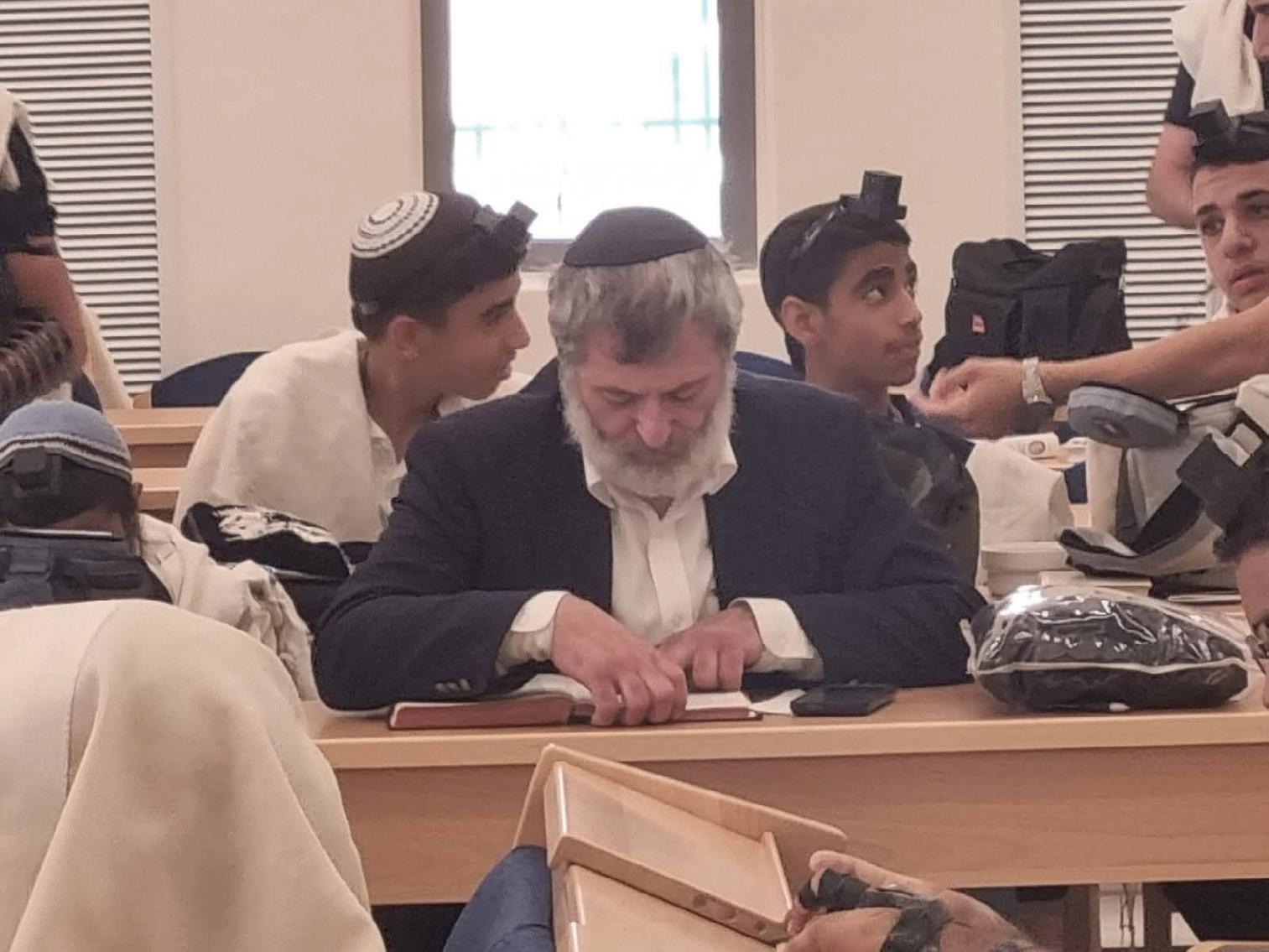
“It’s a tremendous honor,” Wasserman said, “to come and all the children are here.”
Though his father-in-law died about two weeks ago, he has also celebrated a simcha — the birth of his ninth grandchild.
Recently, Wasserman ventured into the Machaneh Yehuda open-air market in Jerusalem to pick up some rolls and cheese, and sat on a nearby bench, the breeze in his face, with his volume of Talmud and his volume of Mishna, and ate.
“I’m a person of simple tastes … and I need my Jerusalem fix,” Wasserman said. “Hashtag ‘very good morning.’”
While in Pittsburgh, Wasserman volunteered as a scuba diver at the Pittsburgh Zoo and PPG Aquarium; he hopes to revisit that role in a new capacity at the Jerusalem Aquarium.
“Hopefully, we’ll be able to hook up,” he laughed, “just like Herzl envisioned it.”
Wasserman laughs at the little transitions
he has experienced coming from the Steel City to the Jewish state. For one, he finds Ashdod’s status as the country’s largest port — yes, even larger than Haifa — to be charming. From his porch, he can see the Mediterranean.
“We were able to sit on our porch and literally watch our [container] ship come in,” Wasserman said. “You can’t do that in Pittsburgh.”
He finds Israelis’ sense of distance bizarre. While some Israelis consider a drive from Ashdod to Jerusalem — about 45 minutes — to be a haul, Wasserman cut his teeth in Pennsylvania, where it wasn’t uncommon to take the five- or six-hour one-way trek from Philadelphia to Pittsburgh.
Forty-five minutes to Jerusalem? “That’s going to the grocery store,” he laughed.
He’s also getting used to living in a drought-stricken country whose residents are thrilled when it rains. On the local news, when the rain is heavy, meteorologists refer to it as gishmay bracha, a Biblical turn of phrase meaning “rains of blessing.”
Wasserman is open to reflecting on his life in the United States but isn’t overly nostalgic, instead focusing on his current and future life in Israel.
“I have absolutely no longing to visit the U.S. beyond the beautiful natural attractions,” Wasserman said. “I miss all of the people of Pittsburgh very much — but I want to see them here. And I miss the weather. I’m a winter guy.”
Why Ashdod? Wasserman admits the choice is not typical, with most Anglos — the Hebrew parlance for native English speakers, like Americans, British and Australians — choosing to live in Bet Shemesh or Rechavia, where there are Anglo bubbles.
On a “pilot trip” to Israel, the Wassermans’ first post-COVID trek outside the U.S., the rabbi visited Ashdod, where his daughter, a doctor, works in an American-style hospital emergency room. While in Ashdod, he met the mayor, who is married to one of Wasserman’s cousins.
“He convinced us to come to Ashdod and put it on the North American aliyah map,” Wasserman said. “North Americans who talk about aliyah, Ashdod does not come up very often. It’s not Jerusalem and it’s not Bet Shemesh — here, the absorption office, they barely speak English.”
Wasserman’s wife, Judith Wasserman, is adjusting to the Hebrew requirements of the land. Though the rabbi’s conversational Hebrew is “very good, a step or two below
EDITORIAL
Evan H. Stein, Board Chair Gayle R. Kraut, Secretary
Evan Indianer, Immediate Past Chair Gail Childs, Dan Droz, Malke Steinfeld Frank, Seth Glick, Tammy Hepps, Cátia Kossovsky, David Rush, Charles Saul
GENERAL COUNSEL Stuart R. Kaplan, Esq.
Jim Busis, CEO and Publisher 412-228-4690 jbusis@pittsburghjewishchronicle.org
EDITORIAL
Toby Tabachnick, Editor 412-228-4577 ttabachnick@pittsburghjewishchronicle.org
Andy Gotlieb, Contributing Editor
Adam Reinherz, Staff Writer 412-687-1000 areinherz@pittsburghjewishchronicle.org
David Rullo, Staff Writer 412-687-1047 drullo@pittsburghjewishchronicle.org
ADVERTISING
Phil Durler, Senior Sales Associate 724-713-8874 pdurler@pittsburghjewishchronicle.org


and Education
AND
Manuscripts, letters, documents
for the return
and
such items.
loss
In the late 1960s, the federal government tried to protect certain animals from extinction through various legislative actions, but President Richard Nixon wanted to do more.
Congress responded with overwhelming bipartisan support and crafted the Endangered Species Act of 1973, which provided a framework for conserving threatened species and their habitats. Following a 92-0 vote in the Senate and 355-4 in the House of Representatives, the bill went to Nixon, who signed it into law.
As the Endangered Species Act marks its golden anniversary, activists, educators and other local residents see 2023 as an opportunity to revisit and even bolster the law.
Filmmaker, writer and Squirrel Hill gardener Boaz Frankel said his knowledge of the law’s protections was shaped by a project he undertook 10 years ago.
While passing through Lincoln, Nebraska, Frankel heard about the Salt Creek Tiger Beetle, an endangered insect whose population tallied around 200. Frankel was captivated by the story and returned to Nebraska months later to interview scientists, public officials and developers about the insect’s precarious state.
The conversations made clear to Frankel that the Endangered Species Act is “about so much more than one insect, or one bird, or one kind of bear or whatever. It’s really about habitat. It’s about an ecosystem,” he said.


Frankel packaged his interviews with cute songs — performed by costumed students from his alma mater at Portland Jewish Academy — and titled the work, “Meet the Beetle.” He showcased the material at film festivals nationwide and on select PBS stations.

His 2012 documentary not only brought attention to a collapsing count of insects but also served as a call for wetland preservation.
Wetlands are among the world’s “most economically valuable ecosystems and essential regulators of the global climate,” but policymakers have caused wetlands to disappear three times faster than forests, according to a 2018 United Nations report.
“A reason that so many modern cities flood, including Pittsburgh, is because we got rid of all these wetlands and marshlands and rivers,” Frankel said.
There are a lot of ways to think about conservation, but one way, Frankel noted, is acknowledging that “by protecting the Salt Creek Tiger Beetles, we’re also protecting ourselves from future flooding.” The mindset may be human-centric, but its benefit is choosing to “not to destroy things just because we can.”
interesting wrinkle when considering the relationship between humans and conservation.
“You look historically, and extinction was typically caused by these mass weather events or climate-changing meteors,” Goodman said. “Obviously, the current extinction is caused by people for the most part and the effect people have had on the planet. The fact that it’s people that really just took it upon themselves to pass this legislation is pretty cool.”
Legislators saved numerous species from extinction but also demonstrated a desire that wasn’t necessarily intuitive, Goodman noted. Fifty years ago, elected officials used their power as a reminder that “even if it’s a tiny little insect, or a plant, or whatever it is that might not seem insignificant now, once it’s gone, it’s gone forever, and there’s really no way to get it back.”
For Goodman, there’s another way to consider conservation.
“God doesn’t make junk,” he said. “If it was worth God’s time to make a species to put it on this planet, it’s certainly worth our time to make sure that it doesn’t go extinct. I really believe that we were given this planet to take care of, and the planet was given to us to take care of us.”
Discussions about conservation should involve responsibility, Goodman continued: “So many people oftentimes look at the Endangered Species Act as an impediment to economic progress, an impediment to making money, an impediment to just harvesting needed resources. But I think the bottom line is we can still do all of those things, but do them in a responsible manner.”
There’s an irony to revisiting former legislative actions and asking people to adopt similar acts of accountability, explained Howard Rieger, a community activist and past president and CEO of Jewish Federations of North America.
“Here we are 50 years later, and what are we confronting? We’re confronting climate change, which is killing off species, which is causing tremendous drought, which is causing sea level rise,” Rieger said. “And I can’t help but think that one of those significant endangered species is the
and Chicago, where he heads the Jewish Neighborhood Development Council of Chicago. He is particularly proud of a proposal the group worked on with the Audubon Society and Peggy Notebaert Nature Museum to convert eight acres along the North Branch of the Chicago River into a restored prairie vegetation site.
The proposal’s goal, Rieger said, is to reintroduce native plants and pollinators.
Native plants have a “much deeper root system and absorb much more water,” which can help a city like Chicago that — due to its topography and development — suffers from flooding. “Concrete and asphalt are not permeable, so water runs off. Similarly, turf grass, weeds and invasive plants don’t absorb a lot of water,” he said.
Bringing back pollinators, he added, also will boost the crop supply.
“You got to have pollinators for apple trees to blossom, for corn to grow, wheat, etc.,” Rieger said. “When you see tremendous drops in it, even in an area like this, it just tells you that we’re not headed in a good direction.”
Rieger sees these issues as calls for “pikuach nefesh,” the biblical imperative to preserve human life.
“As Jews we have a right and a responsibility to be leaders and to step up to the plate — and, by the way, to work in coalition with others, which is exactly what our political leadership should be doing,” he said. “There are certain things that are so basic: life, liberty and the pursuit of happiness. How are we fulfilling that?”
Beginning April 12, Pittsburgh retailers and grocers can no longer distribute single-use plastic bags. The move was spurred by City Councilperson Erika Strassburger, who introduced the legislation in 2021.
“There are so many things we can do in our backyard to cut down on waste and contamination of our environment, and a plastic bag ban is just one of them,” Strassburger told the Chronicle, adding that there are several reasons to eradicate single-use plastics.
“We know the end product can lead to litter,
she said. “Another piece that motivates people, like me included, is ensuring we protect animal life around us. We want to make sure the fish in our rivers, the birds, whatever it may be, aren’t subject to plastic pollutants that would harm their ability to thrive.”
A 2022 study by PennEnvironment sampled water from Pennsylvania’s 50 cleanest streams and rivers. Microplastics — plastic less than 5 millimeters in length — were found in 100% of the commonwealth’s waterways.
Fish and birds can mistake microplastics for food. Humans also inadvertently consume the tiny pollutants via food, water and breathing; the effect was noted in an April 2022 report in the Journal of Hazardous Materials. Scientists reviewed 17 previous studies on the toxicological impact of microplastics on human cells and found that cell death, oxidative stress and other bodily damage were caused by the quantity of microplastics ingested.
For Strassburger, the upcoming plastic bag ban and earlier environmental efforts signal “the interconnected web we as humans are part of.”
“We are all in contact with other life on Earth,” she said — and that idea should trump political division. “A species going extinct is literally the canary in the coal mine. It is a warning as humans that we cannot preserve our environment for ourselves if we can’t preserve it for animals or wildlife.”
Fifty years after bipartisan efforts led to the Endangered Species Act of 1973, Strassburger said there must be a way of getting people excited about clean air, clean water and a circular economy of reducing, reusing and recycling materials.
“This is something that affects us all,” she said. PJC
Adam Reinherz can be reached at areinherz@pittsburghjewishchronicle.org.
Cellco Partnership and its controlled affiliates doing business as Verizon Wireless (Verizon Wireless) proposes to build a 47-foot pole telecommunications structure at the approx. vicinity of 400 7th Ave, Pittsburgh, Allegheny County, PA, 15219. Public comments regarding potential effects from this site on historic properties may be submitted within 30 days from the date of this publication to: Trileaf Corp, Skylar Bone, s.bone@trileaf.com, 1515 Des Peres Road, Suite 200, St. Louis, MO 63131, 314-997-6111.
pittsburghjewishchronicle.org
because of the pandemic.
By Adam Reinherz | Staff Writer
Bolstering interpersonal bonds and finding ways for congregants to further local causes has benefited her as well, Mangan said.
Last year, she and her husband, Josh, welcomed twin boys.
“It’s important to me that they grow up in a community that I wish I had,” Mangan said of her sons. “I grew up in the South Hills. I grew up in an interfaith family that didn’t really attend any religious organization, but I always felt strongly connected to the Jewish side of my family; and when I went to college I started to explore that on my own.”
As a student at the University of Pittsburgh, Mangan relied on friends, Hillel JUC and the Jewish Community Center of Greater Pittsburgh as tools for developing her Jewish knowledge, she said. After graduating, she and her husband moved to Lancaster, where she was active in Congregation Shaarai Shomayim. The couple remained in Lancaster for almost a decade.
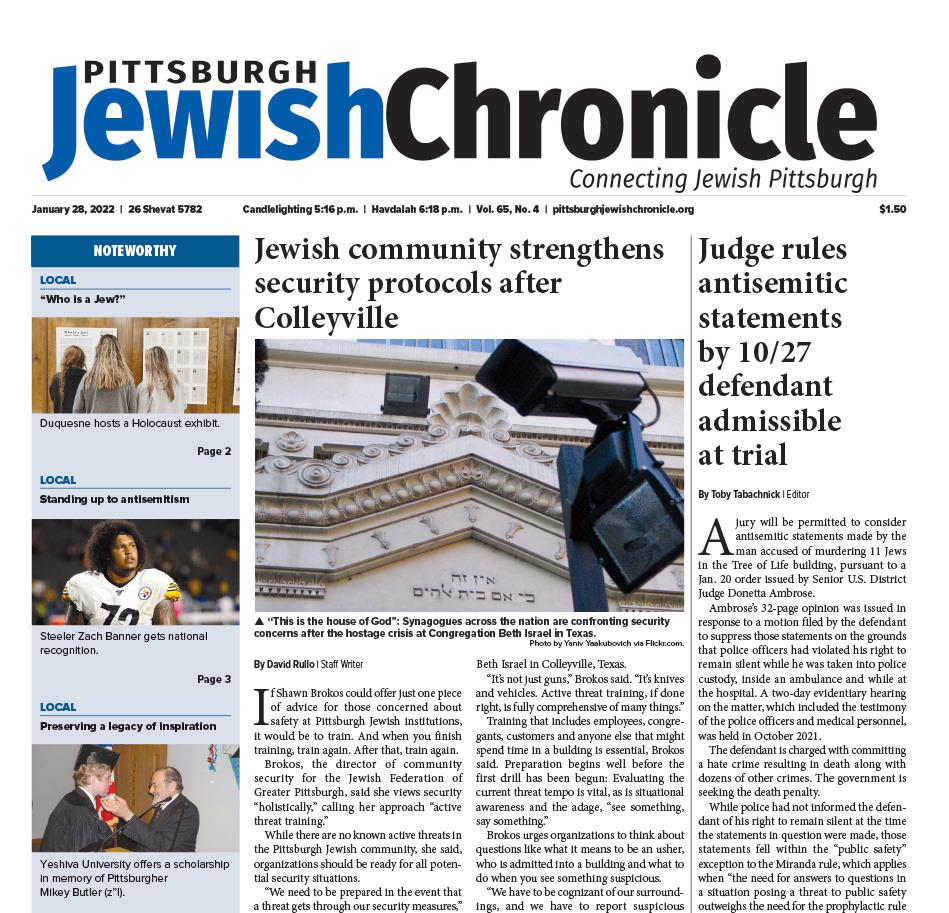
Sarah Mangan doesn’t write lesson plans anymore, but the organizational skills she honed as an English teacher are proving invaluable at Temple Emanuel of South Hills. Since joining the suburban synagogue as its program and volunteer coordinator in August, Mangan has created partnership opportunities between congregants and local organizations, including The Women’s Center & Shelter of Greater Pittsburgh and South Hills Interfaith Movement, as well as chances for members to meaningfully engage outside of Shabbat and holiday services.
While Temple Emanuel’s early childhood center and religious school meet the needs of numerous young people and families, “I sort of see myself filling in the gap,” Mangan said.
The population Mangan typically works with consists of community members who “want to strengthen their relationships with others and strengthen their Judaism through social action or through adult education.”
Mangan, 34, said she’s enjoyed contributing to longstanding institutional groups, such as Women of Temple Emanuel and Men of Temple Emanuel, as well as exploring new avenues of communal growth.
She pointed to an upcoming Shabbat dinner, as well as a Purim karaoke night, as examples of fun ways Temple Emanuel members can come together after being apart for so long

In 2021, they returned to Pittsburgh to be closer to family.
“When we moved back, it was important for me to continue to have a Jewish community in our lives, especially with our children being young,” Mangan said.
Though she enjoyed teaching English and language arts at The Campus School at Carlow University, when a position at Temple Emanuel opened, Mangan jumped at the opportunity.

“It just seemed like the right fit for our family at the time,” she said. “And I’m really glad that I took the leap because I’ve been really enjoying it.”
Trading a classroom for synagogue office space didn’t require Mangan to eschew her former practices, though.
“It’s all of my favorite parts of teaching,” she said of serving Temple Emanuel members. “I get to work with people. I get to organize things. I love to plan, so I’ve been having a lot of fun in this role.”
Temple Emanuel’s Rabbi Aaron Meyer said the congregation has greatly benefited from Mangan’s involvement.
“Temple Emanuel is fortunate to have Sarah building relationships in both the Temple and greater South Hills community and thinking about the engagement and programmatic offerings that will enrich Jewish life,” he said. “Sarah’s warmth and talent
fosters connections between people and their passions while furthering Temple’s mission of living, learning and leading Judaism.”
Mangan said it’s meaningful to know that her efforts aren’t only benefiting peers but creating pathways for future community members.
“I think a lot of us who get into education value doing good in the world,” she said. “The fact that I get to do that — I get to
participate in all of these activities, but also I get to provide that opportunity for others — is incredibly meaningful to me. I love that my children are going to grow up seeing me doing that and modeling that and enjoying it, and I hope that one day they’ll enjoy it, too.” PJC
Adam Reinherz can be reached at areinherz@pittsburghjewishchronicle.org.

Submit calendar items on the Chronicle’s website, pittsburghjewishchronicle.org. Submissions also will be included in print. Events will run in the print edition beginning one month prior to the date as space allows. The deadline for submissions is Friday, noon.
SUNDAYS, JAN. 8 – FEB. 26
Join a lay-led online Parashah study group to discuss the week’s Torah portion. No Hebrew knowledge needed. The goal is to build community while deepening understanding of the text. 8:30 p.m. For more information, visit bethshalompgh.org.
MONDAY, JAN. 9
Join Temple Sinai for Make ‘n’ Eat Monday Nights — A Year of Spices sponsored by the Women of Temple Sinai. January’s spice is cumin, with instructor Annie Weidman. The instructor will lead students in making a meal so everyone can eat together and taste the featured spice. 6 p.m. $15. templesinaipgh.org/event/spicecooking.html.
MONDAYS, JAN. 9 – FEB. 27
Join Congregation Beth Shalom for a weekly Talmud study. 9:15 a.m. For more information, visit bethshalompgh.org.

MONDAYS, JAN. 9 – MAY 15
Understanding the Torah and what it asks of us is one of the most important things a Jew can learn. But most Torah classes begin in Genesis and never finish the first book. If you want a comprehensive overview of the whole Torah, Torah 1 is the course
for you. In the first year of this two-year Zoom course, Rabbi Danny Schi will teach Genesis, Exodus and the first half of Leviticus. In the second year, he will complete Leviticus and cover Numbers and Deuteronomy. $225. 9:30 a.m. foundation. jewishpgh.org/torah-1.
TUESDAYS, JAN. 10 – FEB. 28

Join Temple Sinai for a weekly Talmud class with Rabbi Daniel Fellman. Noon. On-site and online. For more information and for the Zoom link, contact Temple Sinai at 412-421-9715.

TUESDAY, JAN. 10
Are you a senior with your afternoons free? Temple Sinai is starting a new activity just for you — Lunch and a Movie. Join them for Moroccan food and enjoy the classic movie “Casablanca.” $10. Noon. Register at templesinaipgh.org/event/ SeniorLunchMovie.html.
WEDNESDAYS, JAN. 11, 25; FEB. 8, 22
Hadassah Greater Detroit invites you to Beyond Shtisel: A Closer Look at the Hasidic World, a four-part virtual series learning about di erent Hasidic communities, discussing some provocative issues, and viewing videos of Hasidim in their home environments. Gain an understanding of what the life of Hasidim is really like. 7 p.m. $10 per session or $35 for all four sessions. hadassahmidwest. org/GDShtisel.
THURSDAY, JAN. 12
Join Classrooms Without Borders for a post-film discussion of “Liga Terezin,” with Oded Breda,
Michael Schwartz and moderated by Avi Ben Hur. “Liga Terezin” is a documentary that tells the incredible story of the soccer league that took place in Ghetto Theresienstadt, 40 miles northwest of Prague. 3 p.m. cwbpgh.org/event/post-filmdiscussion-liga-terezin.
Save the date for NCJW’s conversation with local romance novelist Lainey Davis. Enjoy an evening of cocktails and tales while learning about the writing process, hear an author-read excerpt and ask questions. 5 p.m. Registration details to follow. ncjwpghevents.org/upcoming-events.
In celebration of the birthday of Rev. Martin Luther King Jr., Tree of Life Congregation and Ebenezer Baptist Church will worship together on Unity Weekend. Join Tree of Life’s Shabbat morning service and Ebenezer’s Sunday morning service. 9:45 a.m. Tree of Life is located at Rodef Shalom, 4905 Fifth Ave. Ebenezer Baptist is located at 2001 Wylie Ave. treeoflifepgh.org/event/unity-weekend.
All Pittsburgh seniors are welcome to attend the January meeting of the Squirrel Hill AARP. Learn about Rob Rudy and his mother, Sharon, who cofounded Outreached Arms — a nonprofit that meets the needs of people with food insecurity. Please bring new or clean used men’s, women’s and children’s winter clothing and toiletries to donate. Refreshments will be served. For more information, call President Marcia Kramer at 412-656-5903. 1 p.m. Falk Library, 4905 Fifth Ave.
SATURDAY, JAN. 21
Join Temple Sinai for a special concert with musician Eliana Light. Great for all ages. Free and open to the public. Registration required. 7 p.m. templesinaipgh.org/event/ ElianaLight
SUNDAY, JAN. 29
Join Temple Sinai and award-winning author Lisa Barr on Zoom to discuss her book, “Woman on Fire.” 6 p.m. Free. Register at templesinaipgh.org/event/ LisaBarr.html.
MONDAY, JAN. 30
Join Beth El Congregation of the South Hills for an evening with award-winning author and expert on antisemitism Jud Newborn. He will discuss the topic “The White Rose Anti-Nazi Resistance and Heroes Today in the Fight for Democracy.” The event will begin with a wine and cheese reception, followed by the lecture. Virtual options are available. 7 p.m. 1900 Cochran Road, 15220. Free. forms.gle/xeMTmZ3ZBfQqshzh9.
Registration is now open for “Melton Core 1: Rhythms and Purposes of Jewish Living.”
This 25-lesson course will take you through the year’s cycle — the life cycle traditions and practices that bind us together. Explore not just the what is and how is of Jewish living, but the why is that go with them. 7 p.m. $300 per person, per year (25 sessions), includes all books and materials. Virtual. foundation.jewishpgh.org/ melton-core-1. PJC
The Pittsburgh Jewish Chronicle invites you to join the Chronicle Book Club for its Jan. 8 discussion of “The Escape Artist: The Man Who Broke Out of Auschwitz to Warn the World” by Jonathan Freedland. From Barnesandnoble.com: “Award-winning journalist and bestselling novelist Jonathan Freedland tells the incredible story of Rudolf Vrba — the first Jew to break out of Auschwitz, a man determined to warn the world and pass on a truth too few were willing to hear — elevating him to his rightful place in the annals of World War II alongside Anne Frank, Primo Levi, and Oskar Schindler and casting a new light on the Holocaust and its aftermath.”
Your Hosts:
• Toby Tabachnick, editor of the Chronicle
• David Rullo, Chronicle staff writer
How and When:
We will meet on Zoom on Sunday, Jan. 8, at noon.
What To Do:
Buy: “The Escape Artist.” It is available at area Barnes & Noble stores and from online retailers, including Amazon and Barnes & Noble.

Email: Contact us at drullo@pittsburghjewishchronicle.org, and write “Chronicle
Book Club” in the subject line. We will send you a Zoom link for the discussion meeting.
We hope you enjoy the book. PJC
Toby TabachnickCelebrating 60 Years of Journalistic Excellence
Friday, December Thirtieth, Two Thousand & Twenty-Two

WHEREAS, The Jewish Chronicle was established in January of 1926 when The Jewish Criterion (founded 1895) and The American Jewish Outlook (founded 1934) effectively merged under the newly formed non -profit publishing company the Pittsburgh Jewish Publication and Education Foundation; and;
WHEREAS, The first edition of the Chronicle was published on March 8, 1962; in 2017 the newspaper changed its name to the Pittsburgh Jewish Chronicle to emphasize and uplift the decades of outstanding locally -focused journalism; and
WHEREAS, The Pittsburgh Jewish Chronicle is an independent multimedia Jewish news organization serving the Jewish community of Greater Pittsburgh; and
WHEREAS, The Chronicle provides local, national, and global news of interest to the Jewish community in addition to its notable coverage of local Jewish events and life cycle events and its coverage of culture, food, health, and more; and
WHEREAS, The paper is well known for its journalist integrity. The paper has covered all the significant events in the Jewish community of Pittsburgh, including new starts, major transitions, sorrow endings, and major national and international events; and
WHEREAS, The Pittsburgh Jewish Chronicle has continued to develop along with its readership by publishing daily on its website and social media outlets as well as its weekly print edition; and
WHEREAS, The Chronicle serves as an indispensable source of news and information while working to build and strengthen the Jewish community of the Greater Pittsburgh area; and
WHEREAS, The Pittsburgh Jewish Chronicle has played a vital role in connecting its community since its beginning, with roots dating back to 1895; and
WHEREAS, Sixty years later, the paper is still run by the board of the independent non-profit Pittsburgh Jewish Publication and Education Foundation as a direct continuation of the founders; and
NOW, THEREFORE, I, Ed Gainey, Mayor of the City of Pittsburgh, do hereby proclaim Friday, December 30, 2022, as Pittsburgh Jewish Chronicle Day in the City of Pittsburgh.


Given under my hand and the Great Seal of the City of Pittsburgh at the City County Building in the First Ward of the City of Pittsburgh 414 Grant Street, Pittsburgh, PA. 15219 on this Thirtieth day of December in the year Two Thousand & Twenty-Two
Gainey MAYOR OF PITTSBURGHdeath of Jesus. Their 1965 declaration, known as Nostra Aetate, recast the church’s relations with the Jewish community.
By David Klein | JTA
Jewish groups are among those marking the death of Benedict XVI, the Catholic pontiff who died Saturday at 95, a decade after shocking the world by becoming the first pope since the Middle Ages to resign.
“It is with great sadness that I learned today that Pope Emeritus Benedict XVI has passed away,” Ronald Lauder, president of the World Jewish Congress, said in a statement issued Saturday. “He was a towering figure of the Roman Catholic Church, both as pope and before that as the cardinal who gave the Catholic-Jewish relationship solid theological underpinning and enhanced understanding.”
During his eight years as pope, Benedict took many steps to advance Catholic-Jewish relations. visiting synagogues and Israel and condemning antisemitism on multiple occasions.

But he also reintroduced liturgy praying for the conversion of Jews, accepted back into the church an excommunicated priest who denied the Holocaust and never completely satisfied some who wished to see him more fully denounce his own Nazi past.
Born Joseph Ratzinger in Germany in 1927, Benedict spent a portion of his teenage years in the Hitler Youth organization, something that was mandatory for boys in Germany at the time and that he explained as necessary to obtain a tuition discount at his seminary. Those who knew him at the time attested after his election as pope in 2005 that his participation was reluctant, and Jewish groups who worked with him after the war said he had long worked to rectify the association.
“Though as a teenager he was a member of the Hitler Youth, all his life Cardinal Ratzinger has atoned for the fact,” the Anti-Defamation League said in a statement after his election as pope.

As priest and professor of theology in the 1960s, Ratzinger took part in the Second Vatican Council, a policy meeting of church leaders, as a theological advisor. It was at that council that the church’s leadership rejected centuries of Catholic dogma and declared that the Jewish people should not be blamed for the
Benedict’s predecessor, Pope John Paul II, is remembered as the first pope to visit a synagogue and, upon his ascension to the papacy, Benedict continued that tradition, making a habit of visiting with local Jewish communities on several of his international trips.
In 2008, on a papal visit to the United States, Benedict visited New York’s Park East Synagogue on the eve of Passover, in the first visit by a pope to an American synagogue.
“Shalom! It is with joy that I come here, just a few hours before the celebration of your Pesach, to express my respect and esteem for the Jewish community in New York City,” the pope said to the congregation, according to the church’s records. “I find it moving to recall that Jesus, as a young boy, heard the words of Scripture and prayed in a place such as this.”
The next year, Benedict visited Israel, in a trip that was largely focused around the common roots of Judaism, Christianity and Islam.
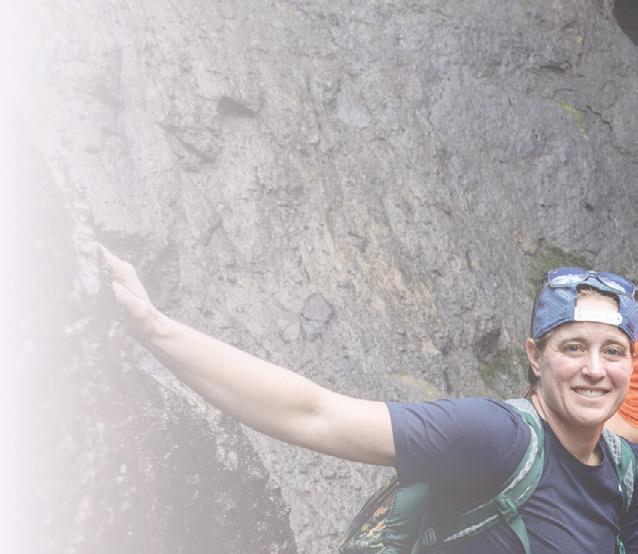
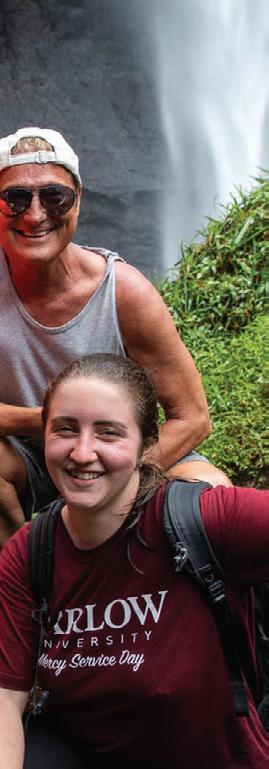
Upon Benedict’s resignation in 2013, he was praised by Israel’s Ashkenazi chief rabbi. “During his period there were the best relations ever between the church and the chief rabbinate, and we hope that this trend will continue,” said the rabbi, Yona Metzger. “I think he deserves a lot of credit for advancing inter-religious links the world.”
Despite the praise, Benedict’s papacy ignited multiple episodes of criticism from Jews alarmed by the effects of his religious conservatism.
Early in his papacy, Benedict allowed for the expanded use of the Tridentine Mass — the pre-Vatican II Catholic liturgy also known as the Latin Mass — which includes a Good Friday prayer that many view as antisemitic because it prays for the conversion of Jews to Christianity. (Benedict’s successor, Pope Francis, has curtailed the use of the Latin Mass, though not specifically because of its language about Jews.)
The ADL’s then-leader, Abraham Foxman, was among many Jewish leaders to condemn Benedict’s move.
“We are extremely disappointed and deeply offended that nearly 40 years after the Vatican rightly removed insulting anti-Jewish language from the Good Friday mass, it would now

permit Catholics to utter such hurtful and insulting words by praying for Jews to be converted,” Foxman said. “’It is the wrong decision at the wrong time. It appears the Vatican has chosen to satisfy a right-wing faction in the church that rejects change and reconciliation.”

In response to the criticism, Benedict altered the Good Friday liturgy to drop a reference to the “blindness” of the Jews, but he maintained language praying for Jews to convert to Christianity.
Benedict also drew criticism for his refusal to acknowledge the Catholic church’s role in the Holocaust, and in particular, the role of the pope at the time, Pius XII — whose path to sainthood Benedict approved in 2009.
Pius has long been accused by Jewish groups of at best remaining silent, and at worst, being “Hitler’s pope” as the Holocaust raged across Europe. While Catholics were involved in many cases of rescue across the continent, initiatives coming from the Vatican itself often applied only to practicing Catholics of Jewish descent, or required Jews to convert to Catholicism.
After the war, Pius’ Vatican sheltered Ante Pavelic, the exiled leader of the Ustaše regime in the former Independent State of Croatia, a Catholic supremacist movement and Nazi puppet state that implemented the Holocaust in Western Yugoslavia. Jasenovac, the third-largest concentration camp in Europe, was built under the Ustaše rule and was the site of death for at least 100,000 people, including between 12,000 and 20,000 Jews.
The Vatican has long maintained that Pius worked to save Jews. Pius, Benedict said in 2008, “acted in a secret and silent way because, given the realities of that complex historical moment, he realized that it was only in this way that he could avoid the worst and save the greatest possible number of Jews.”
Benedict faced the decision of whether to declare Pius “venerable,” a crucial step in the path to sainthood. After initially deferring, he made the declaration in 2009. Now, the decision about whether Pius will be beatified, or declared a saint, could hinge on the contents of an archive that the Vatican is in the process of opening that includes materials about Pius’ handling of the Holocaust.
“The Pope at War,” a recent book by Pulitzer Prize-winning historian David Kertzer, the son



of a rabbi, draws on these new archives to make the case that Pius largely ignored pleas from Jews (while keeping a secret back channel to Hitler); Pius’ advisor used antisemitic language in urging him not to act on behalf of the Jews and the pope personally intervened to prevent Jewish children and their parents from being reunited, Kertzer concluded.
Benedict, who had access to the archive, worked to heal friction with the International Society of Saint Pius XII, a conservative faction within the Vatican that named itself after the wartime pope and added the “Saint” even though he lacked the title.
In early 2009, Benedict removed the excommunication of four priests from the society. Among them was Holocaust denier Richard Williamson, who claimed the Nazis’ use of gas chambers to be a lie.

German Jewish leaders called Benedict’s decision “a slap in the face for the Jewish community.”
“The result of this move is very simple: to give credence to a man who is a Holocaust denier, which means that the sensitivity to us as Jews is not what it should be,” Elie Wiesel said at the time.
“The Vatican has done far more than set back Vatican-Jewish relations,” the scholar (and current U.S. antisemitism monitor) Deborah Lipstadt wrote at the time. “It has made itself look like it is living in the darkest of ages.” PJC

Santos participated in an event with the group on the first night of Chanukah on Dec. 18, where he was feted as one of two incoming Jewish Republicans in Congress; he was elected in New York’s 3rd Congressional District. The next day, The New York Times published a story detailing countless fabrications in his personal and professional resume.
The head of the Republican Jewish Coalition, Matt Brooks, first said he was satisfied with Santos’ account of his family history but reversed course after more damning information was unveiled.
“We are very disappointed in Congressman-elect Santos. He deceived us and misrepresented his heritage. In public comments and to us personally, he previously claimed to be Jewish,” Brooks said. “He
has begun his tenure in Congress on a very wrong note. He will not be welcome at any future RJC event.”
Latin America’s biggest online retailer says it reduced antisemitic products by 89%
Latin America’s largest online retailer has stripped its digital shelves of antisemitic content this year, the result of a push by the regional branch of the World Jewish Congress., JTA.org reported.
Mercado Libre (“free market” in Spanish) was founded in 1999 in Argentina by a Jewish businessman there; it boasts 140 million users, making it more widely used than Amazon in Latin America, where it operates in 18 countries.
Last year, the company announced that it would purge books such as “Mein Kampf” and “The Protocols of the Elders of Zion,” as well as Nazi coins, posters and memorabilia, from its offerings. On Dec. 23 it announced that in the first half of 2021, the number of items available for sale that violated the company’s policies related to violence and discrimination was down 89% compared to the year before.
Federico Deya, Mercado Libre’s senior legal director, credited the work the company had done with the Latin American Jewish Congress in effecting the change, which a
Jan. 9, 1952 — Israel accepts German reparations
report from the company said also included a 23% increase in the detection of hate speech in publications for sale on the site.

Israel’s population rises 2.2% to more than 9.5M
Israel’s population increased by 2.2% in 2022 to 9.66 million, JNS.org reported, citing Central Bureau of Statistics figures released on Dec. 29.
Of the country’s residents, 7.11 million are Jews (73.6%), 2.04 million are Arabs (21.1%) and 513,000 are of other denominations.
The population increase dwarfed the 1.8% growth in 2021, with the difference being attributed in part to a larger number of immigrants in the past 12 months.
Approximately 73,000 new immigrants arrived in Israel in 2022, compared to 25,000 last year, 80% of them coming from Russia and Ukraine.
Google fixes antisemitic definition of ‘Jew’ following uproar
Google users who typed “Jew” in the search feature on Dec. 27 found that the top definition was an antisemitic stereotype, JNS.org reported. The search engine’s first listed definition of “Jew” was: “to bargain with someone in a miserly or petty way.”
an explanation.
After fixing the error, Google Search Liaison Danny Sullivan took to Twitter to apologize on behalf of the search engine company.
“Our apologies. Google licenses definitions from third-party dictionary experts,” Sullivan posted. “We only display offensive definitions by default if they are the main meaning of a term. As this is not the case here, we have blocked this & passed along feedback to the partner for further review.”
Zambia to get first rabbi in six decades
Rabbi Mendy and Rivky Hertzel will move to Zambia early next year to establish a Chabad House and assist the small but thriving Jewish community in the southern African nation, JNS.org reported.
There are an estimated 100-150 Jews in the country of almost 20 million people.
The first Jews to arrive in Zambia were Ashkenazim from Eastern Europe (mostly Lithuania) who migrated in the 19th century when it was a British colony. The Jewish population peaked in the 1960s at around 2,000. PJC
— Compiled by Andy Gotlieb
Items are provided by the Center for Israel Education (israeled.org), where you can find more details.
Jan. 6, 1942 — Toledano is installed as chief rabbi Rabbi Jacob Moshe Toledano, a Tiberias native who is the chief rabbi of Alexandria, Egypt, returns to the Land of Israel to become the Sephardi chief rabbi of Tel Aviv and Jaffa.
Jan. 7, 1858 — Eliezer Ben-Yehuda is born
Eliezer Ben-Yehuda, often credited as the father of modern Hebrew, is born in Lithuania. He and his wife move in 1881 to Jerusalem, where he undertakes the revival of Hebrew as an everyday language.
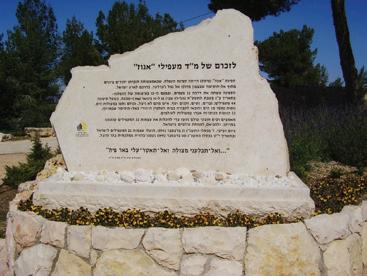
Jan. 8, 1978
— Hadassah Leader Rose Halprin dies Rose Luria Halprin, a two-time national president of Hadassah who played a key role in the construction of the Mount Scopus hospital and held top positions in the Jewish Agency, dies at age 83.

The Knesset ends three days of debate by voting 61-50 to accept more than $800 million in Holocaust reparations from West Germany over 14 years. The decision sparks protests and rioting.
Jan. 10, 1996 — King Hussein visits Tel Aviv
Jordan’s King Hussein makes his first public visit to Israel after signing a peace treaty in 1994. He co-pilots a helicopter to Sde Dov, then visits two Jordanian soldiers being treated at Ichilov Hospital.
The Egoz, a ship leased by the Mossad to secretly transport Moroccan Jews to Israel, sinks a few hours after leaving Al Hoceima on its 12th immigration trip. Forty-four immigrants drown.
Jan. 12, 1989

In the first competition for Israeli athletes in the Soviet Union since the 1967 war, the Maccabi Tel Aviv basketball team beats CSKA Red Army in Moscow, 97-92. Soviet Jews make up much of the crowd. PJC
www.pittsburghjewishchronicle.org

The website provides information beyond the Squirrel Hill shooting, creating a holistic portrait of the community. Users can delve deep into the history of the congregations, such as the earliest bylaws of New Light Congregation, for example.
“It has nothing to do with Oct. 27,” Lidji said, “but one of the things we noticed early on is that people would say, ‘Two Conservative and a Reconstructionist synagogue?’ But, if you’re in town you know that Tree of Life and New Light are very different organizations from each other. This helps people understand that.” The website also will serve as host for the “Meanings of October 27th,” an oral history project created by Aliza Becker and Noah Schoen.
Becker and Schoen conducted 105 interviews of Pittsburghers of all stripes — Jews and non-Jews, first responders, Squirrel Hill
rights of women
residents, community leaders, clergy and more. Twenty interviews are available on the site. Each includes a photo of the person, biography, keywords, index and a transcription of the interview.
“We’re really excited that people are going to be able to see someone they know from the community,” Schoen said. “In this release are people like Nina Butler, Leslie Aizenman and Rabbi Elisar Admon. These are people of our community.”
The collection, Schoen continued, is an archive about community members and their stories, creating a complex tapestry of collective response that doesn’t erase individual experience.
Becker, who lives in Chicago, said that as an outsider, she was motivated to create the oral history to help tell the community’s story to those not from Pittsburgh.
“I wasn’t living the day-to-day experience of being on the ground, of walking by the Tree of Life every day, living in Squirrel Hill,” she said. “I wanted to know what it was like
Continued from page 1
• Allowing the Knesset to overrule Israeli Supreme Court decisions
• Annexing the West Bank
• Expelling Arab Israeli citizens who oppose the government
The letter’s signatories pledge to not invite members of the “RZP block-including but not limited to Otzma Yehudit leaders” from speaking at congregations and organizations they represent. They also pledge to encourage the boards of their organizations to join them in protest to demonstrate their “commitment to our Jewish and democratic values.”
Israeli government ministers sometimes speak at American synagogues to drum up support for their initiatives and proposals.
The letter illustrates a growing schism between Israelis, who are leaning more
Wasserman: Continued from page 3
mother tongue,” Judith Wasserman is taking an online ulpan, or language instruction class, titled Citizens’ Café Tel Aviv. A speech language-pathologist by training, she also is taking a medical ulpan.
Wasserman, who attended an Israeli school in the seventh grade when his family briefly lived in Israel, still keeps ties with Pittsburgh.
Each morning at 5 a.m., he teaches a daf yomi class online, leading instruction on a page of Talmud a day, for people in southwestern Pennsylvania. He also teaches a class at 4:15 a.m. on Fridays.
Wasserman is doing a little teaching in Ashdod, as well. There is a small school near his apartment where he teaches on a volunteer basis.
Then, there are the Moroccans. There’s a large Moroccan community in Ashdod — as well as Russian and French communities, too — and Wasserman leads members of that community in Shabbat services. He jokes that he knows none of the group’s

center-right and right, and American Jews, who are largely center-left politically.
Temple Sinai Rabbi Emeritus Jamie Gibson, who signed the letter, agreed that there is a growing gap between Israelis and American Jews. He also noted his concern regarding various extreme positions held by the ultraprogressive left in some Jewish circles.
“But the far-right really scares me,” Gibson said, “because what they’re willing to do is to deny the democratic principles or basic human rights to Palestinians in ways that I just find unacceptable.”
Gibson has been to Israel 34 times, he said, and supports the country and its right to exist without reservation.
The rabbi, who said he is center-left politically, decided to sign the letter because he supports the Jewish state as a democracy. Elements included in the new coalition, he said, are “frightening for those of us who have a vision of Israel as a Jewish democratic state.”
there and the richness of the stories.”
While the website is innovative in the information it contains and the way it can be accessed, so, too, is the funding for the project: The initial funds were provided from a grant through the Justice Department, Lidji said.
“What [the Justice Department] noticed in other places is that archival material has some benefit to the healing process for people,” he said. “The stuff we have here is very unique in some sense — in some sense, it’s not. You go other places, and they have these collections of things. They decided, though, that Pittsburgh was a unique case.”
Typically, Lidji explained, material is collected, and then an archive is found to partner with. It’s rare for an archive to exist that already has a community’s trust and is invested in cataloging material from an event.
Another unique aspect, Lidji said, is the Rauh’s commitment to the community. The project, he said, is “victim-centered.”
Temple Sinai Cantor David Reinwald said he learned of the letter from an email sent by a colleague in the American Conference of Cantors.
“I was drawn to the fact that political and religious extremism in the top echelon of leadership in Israel is not in line with Reform Jewish values,” he said. “I don’t think any of us think it’s a good thing for the forward progress of Israel; in turn, it’s probably not good for the Jewish people.”
Rabbi Doris Dyen, a Reconstructionist rabbi in Pittsburgh, also signed the letter but did not respond to a request for comment.
Many Jewish organizations have spoken out over the last several months against the proposed government coalition and the policies it is believed to support, including the Union of Reform Judaism and the Rabbinical Assembly, the international association of Conservative Rabbis.
And while the large number of rabbis who signed the letter speaks to the momentum in some circles against the new government, many
customs or songs but is trying his best to acclimate.
“I am as Ashkenazi as they come,” he laughed. “God’s got a tremendous sense of humor.”
In Pittsburgh, Wasserman is far from forgotten. Shaare Torah hired his successor, Rabbi Yitzi Genack, in the spring. But people still have a place in their hearts for Wasserman, said Jonathan Young, the outgoing president of the shul’s board.
“Rabbi Wasserman was part of this community and this shul for more than 25 years,” Young said. “People miss Rabbi and Rebbitzin Wasserman — they were a big part of our family, our simchas, of our losses. When he left, he left Shaare Torah in a wonderful place, where we have the opportunity to build on the legacies he left us.”
Wasserman rejected the idea that a conversation with the Chronicle was a way to keep tabs on a formerly local rabbi.
“It’s not a question of what I’m up to — it’s a matter of ‘make your aliyah plans, make your come-to-Israel plans,’” Wasserman said. “Every Jew has to have a stronger connection to Israel, whether it’s a five-year
plan, a 10-year plan or a plan to visit … the Jewish country is the only home. It’s our land, it’s our home. It’s where we are and it speaks to our heart.
“It’s time to come home — every Jew has a foundation here,” he added. “Everybody
“It is coming from the organizations chiefly responsible for making sure that the victims are taken care of,” he said. “We had to be responsible to the stakeholders. They are many and they’re often not all in agreement. When we started there was no Tree of Life ‘incorporated’ or ‘memorialization working group.’ We’ve had to adapt to those realities.”
Lidji said the purpose of archiving is to make data available to people and organizations, including institutions like the new Tree of Life nonprofit and the University of Pittsburgh.
“Our hope is that all of them see this as a tool they can use,” he said. “That they can all benefit from it. At the end of the day, you can’t collect all information anywhere, so, depending on what researchers want, they may have to go to more than one place; but we’re in conversation with all groups. We certainly see it as a collaboratory.” PJC
David Rullo can be reached at drullo@ pittsburghjewishchronicle.org.
more rabbis did not sign the letter.
Temple Emanuel of South Hills Rabbi Aaron Meyer said he decided against adding his name to the letter because he wasn’t sure if it added any weight to the discussion.
“While agreeing with the concerns about Bazalel Smotrich and Itamar Ben Gvi and the rising extremism in Israel, that parallels the polarization we see in the United States, I don’t know that my voice adds much to the conversation,” Meyer said.
The letter was not signed by any Orthodox rabbi, and no Orthodox group has yet to release a formal statement about the new Israeli coalition government.
The Biden administration, JTA reported, has said that it will judge Israel’s government by its policies, not individuals in Netanyahu’s cabinet. PJC
David Rullo can be reached at drullo@ pittsburghjewishchronicle.org.
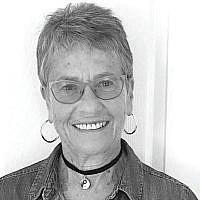
On Jan. 3, Democrats in the House of Representatives, for the first time in almost 20 years, had a new team of leaders. Much has been written about how much the outgoing team of Speaker Nancy Pelosi and Majority Leader Steny Hoyer accomplished in those years. Having worked closely with both of them since they first came to Congress, I saw firsthand the tremendous impact they had on the U.S.-Israel relationship in particular, through both the very public actions they took and especially in the critical behind-the-scenes role they played over nearly four decades.
For Speaker Pelosi, Israel’s creation was, as she has repeatedly stated, “the greatest achievement of the 20th century.” She learned that early on from a father who as a congressman, and later mayor of Baltimore, was outspoken in his support for the Jewish people and for the fledgling state of Israel.
Majority Leader Hoyer became an early champion for the cause of Soviet Jewry and came to appreciate Israel as a key strategic
and democratic U.S. ally from his work on the U.S. Helsinki Commission and on the appropriations committee. In fact, one moment I will never forget was in June 2000 when the then-Republican chairman of the appropriations subcommittee on foreign aid, Sonny Callahan, offered a rare amendment in committee to eliminate a key provision of Israel’s aid. Committee members Pelosi, Hoyer and Rep. Nita Lowey quickly joined together to lead the successful effort to oppose that amendment.
Together, Pelosi and Hoyer were responsible for passing countless pieces of legislation that made the U.S.-Israel relationship as strong as it is today, including: providing critical foreign assistance to Israel; expanding Iron Dome funding; criticizing the U.N. for its treatment of Israel and even then-President Obama for not supporting Israel at the U.N.; supporting Israel’s right to self-defense at key moments during its many wars in Lebanon and Gaza; opposing large arms packages to Israel’s enemies; pressuring the Palestinians to end their support for terrorism; supporting loan guarantees to Israel; and mandating the move of the U.S. Embassy to Jerusalem.
They did so using all the avenues available to leadership — and then some. As speaker, Pelosi rarely sponsored or even supported
legislation, but Hoyer’s name has been at the top of countless pro-Israel bills, letters and resolutions.
What is less well known is the vital work they did behind the scenes to strengthen the U.S.-Israel relationship. As leaders, they determined what bills did — and did not — make it to the House floor. It is no coincidence that so many pro-Israel bills and amendments did come up for a vote — and that those not supportive died a quiet death. It is also no coincidence that those key committees responsible for foreign policy issues had so many members who were strong supporters of the U.S.–Israel relationship. When a proIsrael vote or issue came up, both Pelosi and Hoyer could be seen intensively lobbying their Democratic colleagues in caucus meetings and on the floor, making sure the pro-Israel position prevailed. And throughout their careers, they led their colleagues in dozens of congressional trips to Israel — Pelosi almost every other year, including in 2020 to celebrate the 75th anniversary of the liberation of Auschwitz and in 2018 to celebrate Israel’s 70th anniversary. Every two years for close to 20 years, Hoyer organized trips to Israel for the incoming Democratic freshman class. Over 200 Democratic members of Congress were exposed to Israel,
many for the first time, through 10 of these intensive, Hoyer-initiated one-week trips.
There were, of course, difficult moments, the most difficult one being during the congressional deliberations over the 2015 Iran nuclear deal — which both Pelosi and Hoyer supported — and then Prime Minister Netanyahu’s address to Congress opposing the deal.
But that was the exception. U.S.–Israel relations would not be nearly as close as they are today were it not for the tireless, decades-long efforts of these two leaders. Fortunately, both Reps. Hakeem Jeffries and Katherine Clark — who were groomed and elected to replace them — have strong pro-Israel records and close ties to their Jewish communities. But they have big shoes to fill and new challenges to face. An extraordinary era has ended. Only time will tell whether this new leadership will be able to bring the same intensity, commitment, passion and success to the U.S.–Israel alliance that Nancy Pelosi and Steny Hoyer brought to it these many decades. PJC
Ester Kurz is the former director of legislative strategy and policy at the American Israel Public Affairs Committee. This column first appeared on The Times of Israel.
Given the flurry of critical editorials by leading newspapers around the world condemning the right-wing Israeli government and those who will lead it, even before it was sworn to office, I wish to refocus attention on the harsh security reality that Israel faces along its borders and from within.

The Persian elephant in the room needs to be acknowledged. So far, diplomacy and sanctions have failed to prevent the Islamic State of Iran from becoming a nuclear threshold state. By most assessments, Iran
will obtain enough enriched material to produce nuclear bombs, and it is also in advanced stages of matching bombs with missiles to fire them thousands of miles from Iran’s borders. Israel needs to face that reality or prepare and activate the relevant military measures to negate that. This will be the dominant military threat that Netanyahu’s coalition will have to deal with, and time has nearly run out. The way Israel deals with this specific threat will likely determine how many of the other threats materialize.
Iran’s strategy of encroachment and fight-by-proxy is tightening the virtual noose around many Israeli necks, visible from all our borders in Lebanon, Syria, Gaza, and even in area A of the Palestinian Authority. In this regard, consecutive Israeli
governments have failed to prevent the buildup of substantial terror armies at our doorstep, and the time has come to address those threats in a more direct manner.
The most pressing threat is Hamas, which has stockpiled tens of thousands of rockets in Gaza over the last 15 years and can effectively cover all of populated Israel and bring the country to a standstill. Moreover, Hamas has demonstrated a complete disregard for the humanitarian consequences of waging war with Israel. If Israel really desires to improve the security of its citizens, Hamas has to go — or be denied the weapons to threaten Israelis. Israel has been doing more or less the same thing for the last 15 years, while expecting different outcomes, and that needs to change. A similar threat comes from Lebanon, where Iran-funded
and -controlled Hezbollah continues to drive the country into even deeper financial and social despair, but still possesses a massive arsenal of 130,000 rockets, all aimed at Israeli civilians.
Speaking of Israeli civilians, according to various surveys, Israelis were asked about what they perceive as the biggest threat to their security, and a clear majority responded that domestic terrorism and a lack of law and order are the most pressing issues, even more than a nuclear Iran. Criminal links between Palestinian terrorists and Israeli Arabs and Bedouins are deepening, making it harder to distinguish between hostile elements from within Israel and those from the outside. Both Hamas and the Islamic
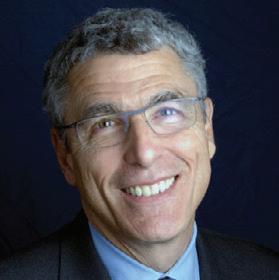
The Book of Exodus tells us that the penultimate plague inflicted on Egypt, the plague of darkness, was one of the worst.
The 16th-century Italian commentator Sforno, who lived in the aftermath of the Inquisition in Spain, wrote that the darkness went beyond the mere absence of light: It was a tangible darkness, a darkness you could feel. We can empathize as
we feel the darkness of intolerance, hate, bigotry and zealotry today.
We kindled our lights during the eight days of Chanukah to remember a time of darkness so bleak that the Maccabees, cruelly oppressed by Antiochus IV, could feel it. The Jews were a tiny minority in the expansive, ancient GrecoSyrian Empire. The Maccabees fought one of the earliest battles for religious freedom. Though they were vastly outnumbered, our ancient heroes remained courageous and determined.
Today, we recognize that no nation is immune to our era’s autocratic repression of democracy, human rights and civil rights. Battles against bigotry, hate and religious intolerance are being
fought in too many places around the world, including in our beloved Israel. With the same determination as the Maccabees, we must fight for religious pluralism and equality in Israel with law and democracy as our weapons and drive out the darkness by bringing the light of equity, compassion and justice.
Loud voices within the new Israeli government are distinguished by their hatred for those who are not like them: non-Orthodox Jews, LGBTQ+ individuals, Palestinian-Israeli citizens, Palestinians, immigrants and others. The extremist political agenda of this new government is profoundly distressing, representing radical policy shifts that are antithetical to the
core values of liberal Jews. We North American Jews can either walk away or lean in with all our might.
Some maintain that because the values that used to bind Jews in the Diaspora to the Jewish State are being replaced with extreme ultra-nationalist and ultra-Orthodox policies, it is time for liberal Jews to walk away from the Zionist project. This would be a terrible mistake: Zionism is more than what Israeli politicians say or do. Authentic Judaism is much more diverse and expansive than the restrictive definitions of the ultra-Orthodox Chief Rabbinate.
Last week, the Chronicle asked its readers in an electronic poll the following question: “What are you planning to do or what did you do for New Year’s Eve?” Of the 145 people who responded, 51% said “stay home and watch the fun at Times Square”; 15% said “have a small number of family or friends over”: 15% said “go out for dinner but be back before midnight”; 10% said “travel out of town”; and 9% said “go to a party or host a party.” Comments were submitted by 30 people. A few follow.
This poll doesn’t have enough options. What about staying home and not watching the fun at Times Square? We’re going to have appetizers, and the rest is to be determined.
Not everybody chooses to celebrate or be social on NYE. I always look forward to it as a time for reflection and intention-setting before beginning the new (secular) year.
I don’t like New Year’s Eve. Too much pressure to have extra fun and make resolutions I can’t keep. I prefer to treat it as just another fine day.
Continued from page 12
Jihad in Gaza are vying for power over a weak and corrupt Palestinian Authority, led by an ailing Abbas — and anarchy looms just around the corner — which could ignite Judea and Samaria (aka, the West Bank) and start a third intifada. Israel has no interest in this, but desperately needs to reevaluate its policy regarding the PA. We cannot continue to prop up a hostile entity that spends most of its resources on fighting Israel, whether by financing terror, lawfare, BDS or undermining it in the media. The PA has proven itself a failure, and Palestinians and Israelis deserve a better option. Of various options, a clan-based system of local governance appears to be the most natural and longterm prospect for stability and prosperity for Palestinians.
Israel will have to choose which threats to focus on immediately, and which to manage or delay. A tough choice. To succeed in safeguarding the Jewish state for generations to come, Israel needs to take bold decisions, but try not to act alone, especially against the Iranian nuclear threat — which is a menace to global stability and not only an Israeli issue. Hamas should not be allowed to continue to terrorize Israelis with their rockets and tunnels, and Hezbollah must be
I am embarrassed to admit that I have probably been in bed by 12:10 a.m. in most of the last dozen New Years. Don’t tell my 20s self this, but I actually now adhere to the adage “Nothing constructive happens after midnight.” Between drunk drivers and ill-advised decision-making, I much prefer eight hours of
deterred from implementing Iranian dictates against Israel. Both these terror armies have been allowed to fester for too long, with Israelis paying the price.
But most importantly, Israel needs to focus its collective energy on these pressing issues, set aside political differences, and not get carried away with distractions or political whims, while working with like-minded democracies around the world to promote peace and prosperity. War and bloodshed can be avoided if Israel succeeds in building diplomatic and pragmatic bridges, based on the revolutionary Abraham Accords, with additional Arab neighbors and regional powers.
I expect Netanyahu to implement lessons learned from his previous governments, as well as those generated by his predecessors, to dramatically improve Israeli security for generations to come. After all, this is why Israelis elected him and that is what they demand of him. PJC
Brigadier-General Amir Avivi (Res.) is the founder and CEO of the IDSF, an NGO comprised of almost 5,000 members who served in various Israeli security organizations, including dozens of reserve duty generals. The IDSF focuses on national security, education and the strengthening of Zionist values in Israel. This column first appeared on The Times of Israel.
Our readers are invited to submit poems to the Chronicle’s Poetry Contest. Winning entries will be published in our Feb. 3 issue. The theme is women in the Torah.
Three winners will each receive a $54 gift card to Pinsker’s Books and Judaica, supplied by an anonymous donor. All submissions must be received no later than Jan. 18.
Poems must be submitted to newsdesk@ pittsburghjewishchronicle.org. Please type “Poetry Contest” in the subject line. The poem must be in a Microsoft Word file. No PDFs or handwritten entries will be accepted.
• One submission per author
• Must include the author’s name, address, phone number and email address
• Poem should reflect the theme of women in the Torah
• Unpublished poems only PJC
restful sleep rather than playing on my phone/ carousing/watching TV.
We have two young kids, and they’re very active, so we try to avoid crowds. We will walk around the corner in Squirrel Hill to try to see the fireworks.
We celebrate with the same dear friends every year. We rent a big house and enjoy time together.
We (four old ladies) have a tradition of going out for dinner and then returning to one of our homes where we schmooze and watch TV until midnight, when we watch the ball drop and then have champagne and dessert. Have been doing it for about 40 years!
I will not celebrate the Gregorian New Year. I have already celebrated Rosh Hashanah, the true new year.
Going to dinner with another couple but then going back to their house to watch the ball drop. And stay up until 2 a.m.! It’s only
Continued from page 12
This is the moment for liberal Jews to fight even harder for the Jewish state envisioned in Israel’s Declaration of Independence. Leaders of the new Israeli government are hoping that we will abandon Israel and allow them to create a new Israel that is divisive, tyrannical and tribalistic. This is why they fight us so bitterly at the Western Wall, and why they stymied the agreement that would have created an equitable prayer space at that holiest of Jewish sites.
We will not stand idly by while the most important project of contemporary Jewish life, the State of Israel, is led down the road of autocracy by extremists. Instead, we will renew our dedication to the State of Israel as a safe home for all her citizens and the democratic, pluralistic homeland of all Jewish people. We refuse to allow extremists to subvert religious equality in Israel.
The Reform and Conservative Jewish movements are growing in Israel, showing that Israelis yearn for a Judaism that is egalitarian, relevant, evolving and morally rigorous.
The progressive Zionism we embody is not reliant on the politicians or parties in power; rather, it is tied to the diverse people of Israel and the bedrock values of “freedom, justice and peace” upon which Israel was built and are enshrined in
New Year’s Eve once a year after all.
My wife and I do not plan on doing anything other than what we would ordinarily do on a Saturday night.
The new year is Rosh Hashanah. We are Jews.
I’ll go to bed at the usual time. The year will change without my witnessing it, and we need our sleep at our age!
I have never liked New Year’s since I was a teen. Who wants to kiss a bunch of strangers?
Stay home make a nice dinner and watch TV with my two wonderful cats! PJC
Toby TabachnickChronicle weekly poll question:
What do you think of the new Israeli government led by Prime Minister Benjamin Netanyahu? Go to pittsburghjewishchronicle. org to respond. PJC
its Declaration of Independence. This is a critical time to invest our energy and resources in growing the pluralistic Jewish communities in Israel. The Israel Religious Action Center, our Reform movement’s social justice arm in Israel, is one such institution that is lighting the way for that just, secure and pluralistic Israel we envision and hold in our hearts.
Over the coming months, our Reform movement will bring thousands of North American Jews — teens, families, and adults — to experience the beauty and miracle of modern Israel while visiting and strengthening our allies throughout the land. The unity and security of the Jewish people matter immensely to us, and the well-being of the Jewish state is also our responsibility. These are two profound reasons why we will not stop standing up and fighting for the Israel we love.
We will not let the darkness overtake the light. The light shines brightly when we celebrate the many authentic ways our people live out their Jewish commitment. The light shines brightly whenever we are partisans for justice and compassion. As inaugural poet Amanda Gorman said, “There is always light. If only we’re brave enough to see it. If only we’re brave enough to be it.” PJC
What has the Chronicle meant to me over the years? (60th anniversary special section, Dec. 30). I’ve been contemplating this question for a few weeks. I wanted to mention religious community, consistency, our beloved book club, free and open political discourse, obituaries, inclusivity — and also try to be different. In the end, the Pittsburgh Jewish Chronicle is about Jewish heart, especially the hearts of Toby Tabachnick, David Rullo and the entire Chronicle staff.
Website address: pittsburghjewishchronicle.org/letters-to-the-editor
No joke: Jewish comedian Steve Hofstetter is starring in an indie thriller filmed inside a former Pittsburgh church.

The filming of “Overhaul” just wrapped, and a first draft is set to be edited by mid-Feb ruary, Hoftstetter said. The movie then will be shopped around to buyers and hopefully distributed to various networks.
“The look of the film is gorgeous — they really did a really wonderful job with it — and so we are very confident that it’s going to sell,” he said. “Overhaul,” which was written by fellow comedian Jay Black, is a “revenge flick” that follows a brother and sister who run an architecture firm and are being hunted throughout Pittsburgh.
Hofstetter plays Michael, the brother. “Overhaul” is the comedian’s fifth film, and Michael is his largest role yet.
“This was really like 11 days of very intense shooting where I’m doing two or three scenes a day. And it was a lot; it was a challenge,” he said.
While starring in a film is a departure from stand-up comedy, Hofstetter said it was a great experience, and “different from what I normally do.”
Hofstetter is the chair of Steel City Arts Foundation, a self-described “live/work/play environment for comedians in Pittsburgh.” He wants the Stanton Heights-based property — the former Stanton Heights United Methodist Church — to be a communal hub and a neighborhood partner.
“While Steel City AF is still awaiting zoning to open to the public, we’re continuing to push forward with development,” according to publicist Taylor Fowler.
“Overhaul,” like Steel City AF, is a means of promoting the city, Hofstetter said.
“A lot of people who aren’t from Pittsburgh, or who haven’t spent much time in Pittsburgh, just picture it as this cold steel town where everything is in black and white and covered in soot,” he said. “And that simply isn’t the case. Showcasing it the way that we’re hoping to do, I think is good for the city economically,
“The majority of the actors, the vast majority of the crew, were all local,” he said.
Noticeable exceptions, he said, include comedians Michael Ian Black and Frank Caliendo, who make cameos.
Although “Overhaul” serves as a “love letter” to Pittsburgh, there’s also a brief shoutout to Hofstetter’s Jewish heritage. Within one of the scenes, perceptive viewers will notice holiday items formerly belonging to Hofstetter’s late father.
“It’s ironic to use this term, but I got to put in
ment sector,” he said.
That optimism is shared by state Sen. Jay Costa (D-District 43).
Following the passage of a $42.8 billion state budget for fiscal year 2023, which included a $30 million boost to the Film Tax Credit Program, Costa said in a statement: “Make no mistake —this is a major victory for the working people of Pennsylvania, especially in western Pennsylvania. This investment is going to attract movie and TV productions alike to our region and stimulate local
their towns and neighborhoods as a home base. Our workforce stands ready, and we’re looking forward to the economic impact this will have in the state.”
Hofstetter is likewise enthusiastic about Pittsburgh’s future as an entertainmentmaking space: “I really do believe that this could be the Rust Belt Hollywood if we really work at it.” PJC
Adam Reinherz can be reached at areinherz@pittsburghjewishchronicle.org.
 By Jessica Grann | Special to the Chronicle
By Jessica Grann | Special to the Chronicle





Ididn’t start keeping kosher until I was in my mid-20s, and I often find myself missing wonderful meals that I used to eat but would no longer choose to have.

I take a lot of pleasure in making those recipes into kosher versions that I enjoy so very much. I especially love it when people who have had the “real version” can’t tell the difference.
There has been a lot of growth in the kosher market, from decent bacon to plant-based dairy products that can be mixed in with it. Bolognese sauce is one of my favorites. It’s like a luxury meat sauce with subtle yet rich flavoring. It takes about 35 minutes to prepare, but it needs to simmer for a couple of hours to get the best results. I suggest serving it with either pappardelle or rigatoni pasta.
Ingredients:
1 pound of pasta, prepared using the instructions on the label
1½ pounds ground beef
1 teaspoon baking soda
5 ounces kosher bacon, Empire turkey bacon or beef fry
3 tablespoons olive oil, divided ½ of a large onion, finely chopped, about 1½ cups
1 large stalk of celery, finely chopped about ¾ cup
1 large carrot, finely chopped about ¾ cup 1 clove garlic, minced
½ cup tomato paste
1½ cups chicken broth
¾ cup dry white wine

1 cup pareve milk substitute. I recommend unsweetened Califia Farms Barista Oat Milk. It has the closest texture to whole milk and leaves no strange aftertaste.
A pinch of nutmeg
1 bay leaf
Salt to taste

Remove the ground beef from your refrigerator, unwrap it and place it in a medium-sized bowl. Sprinkle the meat with 1 teaspoon of baking soda and lightly mix with your hands for about 20 seconds. Cover with plastic wrap and allow to come to room temperature, about 30 minutes. I learned this baking soda trick a few years ago, and it works wonders on frozen ground beef, which often does not brown as nicely as fresh meat. Keep it in mind the next time you want to make chili.
Chop the onion, carrot and celery. This is a mirepoix, which is a staple base for soups and savory dishes. Mirepoix is the French term;
this same mixture of 2 parts onion to 1 part each of celery and carrot is called a soffritto in Italian cooking.
Over medium-low heat, add 2 tablespoons of olive oil to a heavy-bottomed pot or enameled Dutch oven. Add the mirepoix and lightly sauté for 10-12 minutes, stirring every minute or so. The intention is to cook this over medium-low heat to allow tender but crisp vegetables that won’t caramelize.
Once cooked to a tender-crisp, scoop the mixture into a large bowl. Add the last tablespoon of olive oil to the pot, then add the meat, pinching tablespoon-size pieces from the mound and adding them one at a time. Brown for 8-10 minutes, stirring and flipping well at the 5-minute mark. You may notice some foaming around the meat while it’s cooking. That’s from the baking soda, and it cooks out after a few minutes.
While the meat is finishing, chop about 5 ounces of kosher bacon and mince a clove of garlic.
Scoop the browned meat into the bowl with the onion mixture with a slotted spoon, leaving the grease from the beef in the bottom of the pan.
Add the bacon pieces, stirring occasionally,
and allow to cook for another 10 minutes or until the edges start to brown.
Add the meatballs and the mirepoix back into the pot with the bacon and turn the heat up to medium.
Stir in the garlic and allow to cook for about 1 minute before pouring in the wine. As it comes to a boil, use a wooden spoon to scrape all the browned bits from the bottom of the pan, which will add much more flavor to the sauce.
Using a spatula or spoon, start to break down the larger chunks of meat into the smallest bits that you’re able. Some of us have more patience than others — I tend to have less patience for tasks like this, but it’s worth the extra effort.
When the wine is almost cooked out completely from the bottom of the pan, reduce the heat again to medium-low, then stir in the tomato paste, bay leaf and nutmeg. Cook until the sauce starts to darken, another 5-8 minutes.
Pour in the chicken broth. Put the heat to the very lowest setting and simmer uncovered for 2 to 2½ hours or until the sauce is well reduced. If your sauce is looking on the dry side at around the hour-and-a-half mark, add in another half cup of chicken stock. If it seems wet at the 2-hour
mark give it some extra time. The heat should be so low that you only see an occasional bubble. Some burners have a lower cooking point than others, which is why the cooking time may vary depending on your settings and choice of pot. The texture of the sauce will be velvety, and the meat will seem to melt into your mouth due to the long cooking time.
Prepare your choice of pasta to the specifications on the package, drain and toss it immediately into the sauce. Bolognese sauce will coat the pasta differently than marinara sauce. It will seem more like a gravy with chunks of beef and bacon.
Garnish with fresh Italian parsley if you’d like to add a little color to your plate. Add salt to taste; the meat, bacon and chicken broth already have salt in them, and I rarely find the need to add extra salt to this meal.
Traditionally this recipe is topped with cheese, but it’s so good on its own that I’ve never missed it.
Enjoy and bless your hands! PJC



The Geiks weren’t your typical Bronx working-class Jewish family.
The father ran a mob-protected trucking company in Manhattan’s Garment District. One brother, an NYPD detective, chauffeured organized crime couriers around the city with illicit cash. A kid sister visited a Las Vegas casino where the tween was set up with a couple of slot machines in a private room.
And a close family friend was sent up the river for killing a notorious Jewish gangster.
Meet the family whose close ties to Jewish gangsters are chronicled in “Uncle Charlie Killed Dutch Schultz,” a memoir just published by Alan Geik.
Dutch Schultz was the mob name of Arthur Flegenheimer, the Jewish bootlegger and numbers racket kingpin who left this mortal coil in October 1935 at the Palace Chop House in Newark. The triggermen were two Jews, members of the organized crime group Murder Inc. Mendy Weiss and Charles “Bug” Workman, the Uncle Charlie of the memoir’s title, did the hit.
Workman, who reportedly killed more than 20 people before pleading guilty to the murder of Dutch Schultz, was not a blood relative of author Alan Geik. But Workman grew up with Geik’s father on the Lower East Side and was so close to the Geik family he was considered an uncle. The author was in his 20s when he first met Workman, after the hitman was released from a New Jersey prison in 1964.
“I would never think of calling him anything but Uncle Charlie,” said Geik, 80, a retired TV producer and radio host who lives in Las Vegas.
In addition to diving deep into Workman’s story, the book also explores how Jewish mobsters and their hangers-on fought antisemitism, beat up Nazis and helped a fledgling Israel acquire arms for its War of Independence.
“These were people, from the first generation of Jews in America, who fought back against antisemitism in the streets,” Geik said. “Their parents fled the pogroms of Eastern Europe. They were not going to let it happen again and they didn’t.”
Geik’s book joins a crowded shelf of histories and memoirs of the Jewish mob, including “But He Was Good to His Mother: The Lives and Crimes of Jewish Gangsters,” by Robert A. Rockaway, and “Tough Jews: Fathers, Sons, and Gangster Dreams,” by Rich Cohen. Like those books, Geik’s family history provides a sort of reverse image of typical Jewish immigrant stories: Instead of scrapping their way up from New York’s Jewish enclaves into retail and the professions, Geik’s family joined a criminal counterculture.
Books such as Geik’s “really put a personal experience to this whole world that we all know about, the world of New York mobsters,” said Larry Henry, author of a monthly column for the Mob Museum in Las Vegas. “The public’s appetite for mob stories is insatiable.”
“Uncle Charlie Killed Dutch Schultz” describes a tangled family tree ripe with, well, rotten apples. Geik’s father, Lou, was not actually
in the mob but did reap benefits from his ties with organized crime, he concedes. Lou Geik was one of several individuals who delivered mob cash to Workman’s family over 23 years.
“Uncle Charlie felt indebted to my father,” Geik said.
The author’s father is cited as a source for many of the anecdotes included in the memoir. Geik said that while his father’s business relied on mob protection, Lou Geik didn’t have “that extra whatever-it-took to be a really hardened criminal” — a trait, he said, his own older brother Bernard also lacked.
“My brother always wanted to be a gangland figure,” said Alan Geik. “So, instead my brother became a policeman.”
An ultimately very corrupt policeman. Bernard Geik joined the force in 1962 and resigned in 1971 after serving in the notorious Special Investigative Unit, which, as depicted in the book and the motion picture “Prince of the City,” devolved into an extortion ring. After resigning from the NYPD, Bernard Geik was arrested for bribery and bribe-taking in 1974. He reportedly pleaded guilty but served no time.
The disgraced detective went to work at his father’s trucking company. According to the author, his brother was one of the detectives provided by a supervisor to drive their Uncle George and other mobsters around town when they were transporting mob money in New York.
Uncle George Gordon was a real uncle. Gordon is allegedly one of the gangsters the actor George Raft modeled himself after for his roles in 1930s and ’40s crime melodramas. For decades, beginning at a casino and speakeasy near the Hudson River in midtown Manhattan, Gordon had a big hand in organized crime’s gambling operations, supervising enterprises in Florida, the Midwest, Las Vegas and Havana.
Alan Geik isn’t the only keeper of his family’s convoluted story. His sister Iris has her own memories of growing up mob-adjacent, such as when she and her parents were Gordon’s guests at the Stardust Hotel in Vegas when the mob was running its casino and skimming cash from the profits. Gordon wanted Lou Geik to work there.
According to Iris Geik, Gordon posted a guard outside a private room in which she had been ensconced with a couple of slot machines. The 13-year-old was “mesmerized” by the slot machines. Her mother was initially unaware of what was going on.
“I was having a blast,” Iris Geik said. “I’ll never forget when the door flung open and my itty-bitty mother came in with a big guard behind her. She immediately made me stop [playing with the slot machine] and give back the money I had won.”
Iris Geik, now a privacy lawyer in the Boston area, has written hundreds of pages of her own memoir about the wives and girlfriends of the Jewish gangsters, tentatively titled, “The View From the Women’s Table.”
“Their lives were complex but they were also heimische Jewish women,” she said, using the Yiddish word for cozy and familiar. She said her mother and father eloped because they were a mixed couple: Her mother, Reba, was a Sephardic Jew and her father was Ashkenazi.
Geik remembered that as a child she noticed a newspaper article about a family friend being arrested. She said, “Mom! Mom! Look, we’re famous.” To which her mother replied, “That’s infamous, dear.”
Geik said that on several occasions her mother observed: “There are no second-generation Jewish mobsters. Jews don’t make gangsters out of their children.”
Reba Geik had been involved in caring for two of Iris’ aunts who lived in Brooklyn while they were dying. Those acts of kindness had a profound impact on Uncle George, the casino supervisor.
After the aunts passed away, Gordon always stood when Reba entered a room, Iris said. “My mother was very honored by that because he was such a big shot.”
Throughout her life, Reba Geik remained close to Sylvia Lorber, a friend from her teenage years. Lorber was the only mob mistress her mother would spend time with, said Iris. Lorber was the paramour of two Jewish gangsters: Benny Kassop, the brother of Murder, Inc. gunman Sammy Kassop, and Sam “Red” Levine, an observant Jew who wore a kippah under his fedora. Levine won the affection of Lorber while the Kassop brothers were in Sing Sing, the maximum-security prison in Ossining, New York.
“Sylvia was a hell of a lot of fun, but my mother worried about her,” Iris said. “Sylvia told me her stories, which were kind of glamorous when she was young but sad when she was older.” After spending 20 years with Levine, Lorber couldn’t attend his funeral. Sylvia Lorber stopped talking to Reba Geik in her last years.
Jewish gangsters do, on occasion, display some altruism in Alan Geik’s memoir. Take Moe Dalitz, the head of the Cleveland Syndicate. He was a major bootlegger during Prohibition whose flotillas of illegal liquor on the Great Lakes came to be known as The Little Jewish Navy. His family ran legitimate laundry businesses in Boston and Detroit. Too old to be drafted during World War II, he enlisted at the age of 42 and was commissioned as a lieutenant. Dalitz ran the military laundry service on New York’s Governor’s Island — but declined to bunk in the island’s barracks, opting instead to stay at a swanky hotel overlooking Central Park.

Then there was Johnny Eder, a major source
for Geik’s narrative. Eder was part of the Lower East Side teenage crime crew that included Uncle Charlie and Uncle George. As an adult he was a major fence for stolen jewelry and always had a bag of stolen rings on him. Eder also had many connections at City Hall and in the Brooklyn District Attorney’s office.
According to Geik’s account, Eder was the mob’s representative to the Haganah, the Jewish paramilitary force in Palestine. Eder arranged meetings in the noisy kitchen of the Copacabana, a mob hangout, between Haganah agents and mobsters and others described as “former wartime U.S. intelligence agents” working to secure weapons for Israel’s War of Independence. (The late Teddy Kollek, Jerusalem’s longtime mayor, would tell a story about passing cash to an intermediary at the Copacabana, who brought the money to an Irish sea captain with a ship full of munitions bound for the Holy Land. The bagman, according to Kollek, was Frank Sinatra.)
Alan Geik has a very personal connection to the creation of the Jewish state. His late wife Nina was the daughter of Lou Lenart, a World War II fighter pilot who served in the Marines. Geik’s memoir details how the elder Lenart was part of the group of men transporting surplus fighter planes and other weapons to Palestine for use in Israel’s War of Independence. Lenart’s story was featured in Nancy Spielberg’s 2014 documentary “Above and Beyond,” about the creation of the Israeli air force.
The story of how Jewish gangsters used some violent muscle against Nazi sympathizers in New York has been told before in historical accounts, but one episode in Geik’s memoir is particularly dramatic. A pair of Jews attended a Bund rally at Camp Siegfried on Long Island, a summer camp that taught Nazi ideology, and were offered a ride back to the city by a Nazi sympathizer who they ended up beating senseless in Brooklyn.
Alan Geik was not really hungry when he met Meyer Lansky at a Central Park hotel in the late 1950s. The gangster asked the 15-year-old nephew of George Gordon if he wanted a pastrami sandwich. Geik declined. Then Lansky, who struck Geik as an “older Jewish man who I knew was really powerful,” suggested that they split one. It was an offer that Geik did not refuse. PJC
For Jewish sports fans, 2022 was a year of very high highs and particularly low lows.
The fall was dominated by an antisemi tism scandal involving Brooklyn Nets star Kyrie Irving, who shared a link to an antisemitic film on Twitter and initially refused to apologize. Irving was suspended for eight games and brought increased attention to antisemitism, Black-Jewish relations and the Black Hebrew Israelite movement.
Off-court controversy aside, Jewish athletes enjoyed an All-Star caliber year in 2022. Jews across sports shined on the international stage at the Maccabiah Games, the Beijing Olympics and the World Cup. And as the sports world honored some of the best to ever do it — we’re looking at you, Sandy Koufax and Sue Bird — we also got a glimpse of the next generation of Jewish sports stars.
We also bid farewell to some familiar faces who retired, such as Jewish Super Bowl cham pions Ali Marpet and Mitchell Schwartz and the duo behind the Jewish Sports Review magazine. And we shared memories of those who died this year, including Jewish Olympic gold medalist “Ike” Berger, and Vin Scully and Franco Harris — two sports legends who are not Jewish but whose careers are cherished by Jewish fans.
But in the end, here are the Jewish Sport Report’s top Jewish sports moments of the year — plus one to look forward to in 2023.

legend and fellow lefty Sandy Koufax, who had his own highlight this year — more below.
The Minnesota Vikings owe much of their success this season to the right foot of Greg Joseph.
This year was the 50th anniversary of the Munich Olympics massacre, the terrorist attack at the 1972 Games that took the lives of 11 Israelis after an hours-long hostage standoff.
The 2022 Winter Olympics in Beijing kicked off the year in Jewish sports with flair. More than a dozen Jewish athletes from around the world competed in hockey, skating, snowboarding and more.
Perhaps the best known Jewish Olympian was Jason Brown, a figure skater who won a bronze medal at the 2014 Games in Sochi. Brown didn’t medal in 2022 (he finished sixth), but he did nab a personal best score, while skating to the theme from “Schindler’s List.”
Emery Lehman also represented the U.S. on the ice, winning a bronze team medal in speed skating.
With four full seasons in Major League Baseball now under his belt, Atlanta Braves ace Max Fried has solidified himself as one of the sport’s best pitchers.
In 2022, Fried earned his first All-Star selection while winning his third straight Gold Glove award as the National League’s best defensive pitcher. He finished as the runner-up for NL Cy Young Award, given to the league’s best pitcher, and was named to the Second All-MLB team for the second straight year, by posting a 14-7 record in 2022 (identical to his 2021 output) with an MLB-seventh-best 2.48 earned-run average and 170 strikeouts.
The 28-year-old left-hander is a Los Angeles native, and his childhood hero was Dodger
The Jewish kicker — who has engaged with Jewish communities in every city he has played in — has five game-winning field goals this season, including two in a row that each made history.
In Week 15, Joseph put a 40-yarder through the uprights to secure a 39-36 Vikings win over the Indianapolis Colts, capping off the largest comeback in NFL history. The Colts had led 33-0.
Then in Week 16, Joseph blasted a 61-yarder just as time expired to beat the New York Giants, 27-24. The kick was the longest of Joseph’s career, the longest in Vikings franchise history and likely the longest ever by a Jewish player.
From her earliest college days to her final professional game in the WNBA, Sue Bird has been among the best of the best in any sport: She is a two-time NCAA champion, a fourtime WNBA champion, a five-time Olympic gold medalist and a four-time FIBA World Champion. She is the all-time WNBA leader in assists, games played, minutes played, All-Star appearances and seasons played.
Bird announced in June that she would retire after the season, and her Seattle Storm lost in the playoff semifinals to the Las Vegas Aces, ending her 19-year career in the WNBA.
Bird, who obtained Israeli citizenship in 2006 in part so she could play for European teams, became a respected entrepreneur, activist and basketball executive even before her playing career ended, setting her up for a successful next chapter.
After a tense negotiation process, the Israeli families of the victims reached a compensation deal with Germany in time for the official 50th anniversary ceremony. Meanwhile, the Israeli marathon team won gold at the European Championships in Munich, and ESPN produced a documentary about Shaul Ladany, an Olympic racewalker who survived both the Holocaust and the Munich attack. The episode, reported and narrated by Jewish Emmy winner Jeremy Schaap, told the story of the massacre to a mainstream audience on the network’s “E:60” series.
Sandy Koufax’s legacy as the greatest Jewish athlete ever has never been in question. But this past summer, almost 60 years after the Hall of Fame pitcher sat out a World Series game to observe Yom Kippur, Koufax, now 86, was given one of his most meaningful tributes yet: a permanent statue at Dodger Stadium.
The Dodgers unveiled the Koufax statue — next to one of his former teammates, Jackie Robinson — with a pregame ceremony June 18, three years after the statue was originally announced. The unveiling had been postponed due to the pandemic.
Koufax’s Jewish identity — and his famous Yom Kippur sit-out — were highlighted at the ceremony alongside his many career accolades, which include three Cy Young Awards and three seasons each with more than 300 strikeouts and an earned run average below two.
Ryan Turell, the former Yeshiva University basketball phenom, took a big step toward his goal of becoming the NBA’s first-ever Orthodox player.
Turell was selected by the Motor City Cruise in October’s G League draft, joining the minorleague affiliate of the Detroit Pistons. He became the first known Orthodox player in the league.
For Jewish fans in Detroit, Turell’s ascension has provided a boost of excitement and enthusiasm. And for the NBA organization, it created an opportunity to engage with the local Jewish community. The Pistons are offering kosher concessions at the Cruise arena and celebrated Jewish Heritage Night and Hanukkah this month.
In the Cruise’s regular season opener Dec. 27, Turell dropped 21 points in only 17 minutes.
The 21st Maccabiah Games, also known as the “Jewish Olympics,” took center stage in Israel in July.
Originally scheduled for 2021, the quadrennial international Jewish sports competition kicked off at Teddy Stadium in Jerusalem with an opening ceremony on July 14 — and U.S. President Joe Biden made an appearance, becoming the first American president to do so.
Lastly, as the calendar turns to a new year, there is (at least) one major Jewish sports storyline on deck: the 2023 World Baseball Classic, which will take place in Miami in March.
After its Cinderella run in 2017 and an Olympic appearance in 2021, Team Israel returns to the international stage with more major league talent than ever, including All-Star outfielder Joc Pederson and pitchers Dean Kremer and Eli Morgan. PJC
8. Jason Brown performed to “Schindler’s List” at the 2022 Beijing2. Ryan
Turell began his professional basketball career, with a kippahGetty Images/Design by Grace Yagel
his week we complete the book of Bereshit (Genesis) and the Joseph saga with our parashah. Within the book of Bereshit, we move from a God in control and front-and-center in the narrative of creation, to a silent and seemingly inactive God in the Joseph stories. In the beginning God is all powerful, bringing the world into being through speech. Throughout the stories of the patriarchs and matriarchs, God is a main character, speaking directly or through angels, performing miracles, propelling the story forward. Then we get to the last four parshiyot, and God retreats. In the final chapters of Genesis, God does not speak. There is a rich narrative, but it is driven by human initiative. God is no longer an explicit actor.
Joseph’s tears, in contrast, are responses to mixed feelings, to the push and pull of contradictory and dueling emotions. Joy at being reunited with his brothers along with anger at their past behavior. Longing for reconnection with his family, while being suspicious and distrustful of them. Not black and white, but gray.
By David I. Klein | JTA

Rabbi Ephraim Mirvis, chief rabbi of the United Hebrew Congregations of the British Commonwealth — commonly referred to as the United Kingdom’s chief rabbi — can now add a “Sir” to his title.
Mirvis will be named a “knight commander of the order of the British Empire,” according to King Charles’ New Year Honours list. Since 1890, the U.K. has announced new knighthoods and other chivalric honors only twice a year, on New Year’s Day and on the birthday of the ruling monarch, which in the past was April 21 for Queen Elizabeth II but going forward will be Nov. 14 for King Charles III.


“I am enormously honoured and deeply humbled by this award. It will be particularly moving for me to receive this award from His Majesty The King, in his first year as our monarch,” Mirvis said, according to Britain's Jewish Chronicle.
Though Mirvis’ most recent predecessors, Jonathan Sacks and Immanuel Jakobovits, had also received knighthoods during their terms as chief rabbi, the title has not always been a given.

King Charles’ list noted Mirvis’ work in the field of interfaith dialogue and his advocacy for Uyghur Muslims suffering under oppressive policies in China. The list also noted Mirvis’ efforts to make the Orthodox world more inclusive of women and LGBTQ Jews.
— WORLD — Please see Mirvis, page 22
The Torah begins with a world of clear categories. The steps of creation involve dividing things into neat opposites: light and dark, land and sea, earth and sky. Everything is defined by a simple adjective, tov (good). By the end of Genesis, there isn’t such clarity. We’re in a very human story. Motivations for behavior are complex: Was Jacob intending to alienate Joseph from his brothers? Was Joseph’s decision to share his dreams narcissistic, or innocent? Different emotions coexist: Joseph hates his brothers but also misses them dearly; Joseph seems to revel in his powerful role in Pharaoh’s court, but longs for his family of origin. The story raises essential human questions such as “Can people really change?” and “What does it take to forgive?” These questions do not have simple answers. We have moved from the clear black and white world of Creation to a human realm painted gray.
Ambiguity and complexity is evident in one unique aspect of the Joseph stories: the frequency of tears. Nowhere else in the Torah do we have a character who cries so often. I have always found Joseph’s weeping to be moving. The catharsis of the tears is deeply satisfying to the reader.
In these final parshiyot, Joseph cries seven times. Each incident of tears is in response to complex layers of emotion, and sometimes to opposite emotions coexisting in the same moment.
Here are the occurrences of Joseph’s tears: when the brothers appear before Joseph and, overcome by emotion, he turns away to weep; when Benjamin finally appears and out of compassion, the text says, Joseph retreats to his chamber and cries; right before revealing his identity and right after; upon reuniting with his father, Jacob; and twice in our parashah: when Jacob dies, and then after finally forgiving his brothers.
What are we to make of all this crying?
These tears testify to the depth of character that we see in the portrayal of Joseph which we have not seen before in the Torah. A few other figures do cry in Genesis. What’s different here is the kind of tears. The tears of Esau and Leah, for example, are fairly one-dimensional: Esau’s anguish at being denied the birthright; Leah’s sadness at being rejected by Jacob. Strong emotions, yes, but they are straightforward, one-dimensional.
Rav Aharon Lichtenstein — in a lengthy exposition on Joseph’s tears — points out that Joseph doesn’t weep earlier in life (pit, sold into slavery, prison, etc). There are no tears when he is at the apex of his own suffering. Rather, he weeps later in life, not in response to his own misfortunes, but each time in response to deep and often conflicting emotion. Rav Lichtenstein argues in favor of Rashbam’s interpretation, that Joseph’s tears represent a break in the fortitude and restraint he had shown for decades in Egypt. The tears’ function was to remove the mask that Joseph wore all the years in Egypt burying his identity, as he rose in stature and tried to forget where he came from. Upon seeing his brothers again, the memories of the past came flooding back and with them a host of mixed emotions.
Part of the catharsis of this narrative arc is that Joseph succeeds in breaking the pattern of family in-fighting that plagued the book of Bereshit. Generation after generation, brothers didn’t fare well. Cain killed Abel. Isaac and Ishmael were forcibly separated. Jacob stole the birthright and blessing from Esau, and while they did eventually embrace each other years later, there was no reunification of the family. Joseph is the one to finally break the toxic trope of brother against brother. After all these generations of broken family ties, Joseph is the one who is able to forgive his brothers and reunite the family.
We have come a long way from the allpowerful God whose speech and actions determine events. We are now squarely in the human realm. No miracles. No divine commands. Just human beings faced with difficult decisions. Just tears and the complex layers of emotion that elicit them.
In the final chapters of Bereshit, God’s face is hidden. And yet, God’s hand is felt throughout, an undercurrent of the whole plot. Joseph claims many times that his dreaminterpretations are not his own, but come from God. And Joseph interprets his whole life trajectory as God’s plan, as he states in the climactic scene of self-disclosure: “I am your brother Joseph whom you sold into Egypt. Now, do not be distressed or reproach yourselves because you sold me hither; it was to save life that God sent me ahead of you.”
In the end Joseph isn’t only an interpreter of dreams. He interprets life, perceiving the workings of God beneath the surface of events.
In our time, too, of course, God’s face is hidden. We are far from the black and white clarity of Creation. We are ensconced in the gray zone, the messy human realm.
So what is in our power to do? The Joseph story seems to suggest two possibilities. We can interpret our experiences, seeking glimpses of God at work in our lives. And we can fully inhabit our human dramas, allowing ourselves to be flooded with feeling, and letting our tears flow. PJC
Amy Bardack is the rabbi of Congregation Dor Hadash. This column is a service of the Greater Pittsburgh Jewish Clergy Association.


BLANK: Connie L. Blank, on Wednesday, Dec. 28, 2022. Beloved mother of Emily (Jim) Sabol, Daniel and Joshua Unikel; beloved grandmother of Norah Sabol; beloved daughter of the late C. Louis Kingsbaker and the late Suzanne L. Kingsbaker; sister of the late Kim L. Kingsbaker; niece of the late Barbara (John S.) Hast, Diane (Doug) Butturff and Charles (Kathy) Livingston; aunt of Jamie Alderman; and great-aunt to Mackenzie and Madelyn Alderman. Connie cared tremendously for those around her: her family, her friends and her patients. She was passionate about family events at her home, animals, music, crafts, baking and sports. Services were held at Ralph Schugar Chapel. Interment West View Cemetery of Rodef Shalom Congregation. In lieu of flowers, contributions may be made to Kopy Kat Sanctuary, P.O. Box 241, Delmont, PA 15626, or the Arthritis Foundation (arthritis.org).schugar.com
GINSBURG: Ruth F. Ginsburg, on Saturday, Dec. 31, 2022. Beloved wife of the late Lawrence H. “Larry” Ginsburg. Loving mother of Michael (Tara) Ginsburg and Howard (Kathy) Ginsburg. Adoring grandma of Max, Emily, Henry and Lauren Ginsburg. Services were held at Ralph Schugar Chapel, Inc. Entombment at Homewood Cemetery. Contributions may be made to the Jewish Association on Aging, 200 JHF Drive, Pittsburgh, PA 15217. schugar.com
grandchildren: Amelia Miller of Atlanta, Georgia; Rachel, Devon, Dylan and Aidan Stein of Fox Chapel; and Thomas and Catherine Irvine of Arlington, Massachusetts. Services were held at Temple David. Interment at Temple Sinai Memorial Park. In lieu of flowers, the family asks that memorials may be made in her honor to the Kay Liss Memorial Tree Fund for the beautification of the grounds at Temple David. Donations can be sent to Temple David, attention: Harvey Wolfe. Arrangements entrusted to Ralph Schugar Chapel, Inc., family owned and operated. schugar.com
REIFMAN: Ruth M. (Perilstein), on Thursday, Dec. 29, 2022. Beloved wife of the late Paul “Peize” Reifman. Loving mother of Bonnie (Dr. Kenneth) Pakman, Linda Hrabar, Scott (Coleen) Reifman and the late Gary Reifman. Sister of the late Paul, Sidney and Harris Perilstein. Also survived by grandchildren, great-grandchildren, nieces and nephews. Services were held at Ralph Schugar Chapel, Inc. Interment B’Nai Israel Cemetery. In lieu of flowers, contributions may be made to Make-AWish Foundation, 707 Grant Street, #3700, Pittsburgh, PA 15219, Parkway Jewish Center, 201 Penn Center Boulevard, Building 1, Suite 530, Pittsburgh, PA 15235 or LGAR, 800 Elsie Street, Turtle Creek, PA 15145. schugar.com
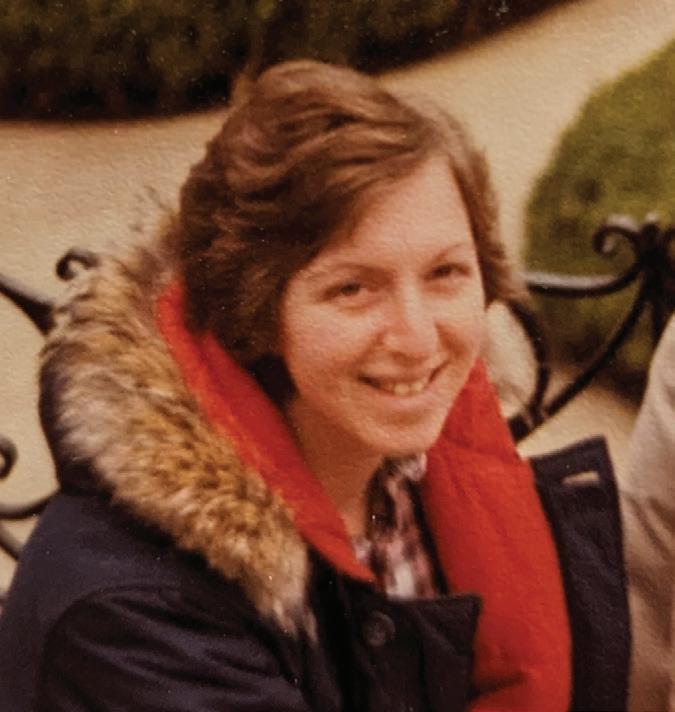
GOLDMAN: Joberta (Kreimer) Goldman, age 76, beloved mother, grandmother, friend and Jazzercise enthusiast passed away peacefully surrounded by her two sons, Jeremy and Bradley, on the evening of Dec. 30, 2022. Predeceased by her parents, Hilda and Isadore Kreimer of Squirrel Hill, and her husband Stanley. Joberta taught third grade before retiring to raise her two boys. Joberta was an avid classic movie and Broadway buff, often quoting her favorite lines and never missing a moment to share who played which role in a certain film. She was always the loudest laugh in every theater she was in and also caused the loudest laugh with her off-beat humor and her precise choice of four-letter words. Above all, her favorite thing to do in life was to go to her thrice-weekly Jazzercise classes. She is survived by her two sons, Jeremy Goldman (Beth Goldstein) and Bradley Goldman (Amy Cohen); her granddaughter, Hannah Goldman; and her granddogs, Penny and Clementine. Services were held at Ralph Schugar Chapel, Inc. Interment at Tree of Life Memorial Park. In lieu of flowers, the family asks that memorials may be made in her honor to the Humane Animal Rescue of Pittsburgh. schugar.com

LISS: Kay Ann (Fager) Liss, age 80, beloved mother, grandmother, friend and community leader, passed away peacefully surrounded by family on Dec. 30, 2022. Predeceased by her parents, Theron and Marion Fager of Saginaw, Michigan, and her brother Robert Fager of Boston, Massachusetts. Born and raised in Saginaw, Kay was a proud Michigan State alumna and closely followed their basketball and football teams — Go Spartans. Upon graduating, Kay taught middle school in Indiana and Pittsburgh prior to moving to Thailand for two years with her former husband. Upon returning to the States, they raised their three daughters in Monroeville where Kay was active in the PTO, Gateway band boosters and Girl Scouts. As her children grew older, she took a job with the Girl Scouts of SWPA and for more than 20 years developed scouting in low-income communities around Pittsburgh. Upon retirement, Kay volunteered much of her time to Temple David of Monroeville. She served two terms as Temple president, chaired the caring and ritual committees and enjoyed participating in the sisterhood, book club and the religious social action committee. Kay traveled twice to Israel and once to Cuba with her congregation. In addition to travel, Kay found joy in nature, especially birds, plants, sunshine and her cat Walter. Kay’s greatest joy was her family. She is survived by her three daughters, Kimberly Miller (Mark), Allison Stein (Bradley), Jennifer Irvine (Darrell), and seven

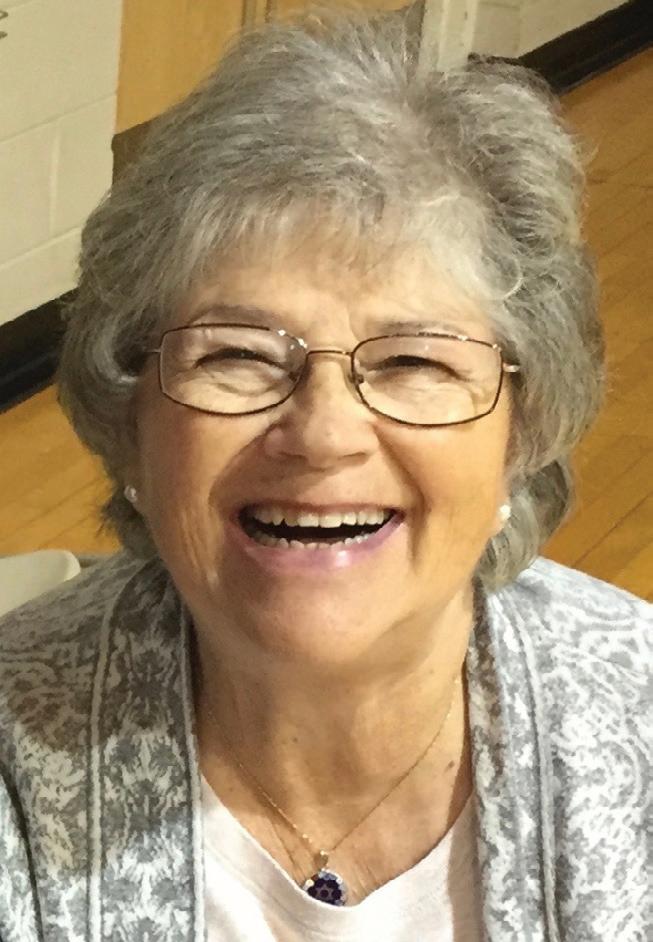
SEGAL: Jean Zelda Horovitz Segal, beloved mother, grandmother and friend, passed away peacefully at home surrounded by family on Nov. 1, 2022, in Mill Valley, California, at the age of 98. Jean was the eldest and last living child of five children born to Bertha Brown Horovitz, a seamstress, and Charles Horovitz, a produce shopkeeper. She grew up on the North Side, along with her four siblings and an extended family of aunts, uncles and cousins, all Pittsburgh natives, where she developed a lifelong love of music and community. Jean graduated with honors from Taylor Allderdice High School and, in 1947, married Seymour Leonard Segal. They made their home in Squirrel Hill and were active members of Beth Shalom Congregation until their move to northern Virginia in 1958. Jean and “Sy” raised five children in Virginia, who were the joys of her life. She was an excellent cook and baker, hostess and homemaker who shared her love through preparing amazing meals for friends and family. The couple lived briefly in California as well as Virginia, and retired to Florida in 1989. Jean was preceded in death by her beloved husband of 51 years, Seymour, in 1998, and more recently, sisters Lorraine Horovitz Meyers and Ruth Horovitz Rosenberg and brothers Jerome Horovitz and Jack Morton Horovitz. She is survived by her children, Elliott Segal (Linda), Barbara Segal, Sandra Segal Gottlieb, Shelley Thornton and Karen Goldman and grandchildren Daniel FitzSimmons, Lauren Gates, Samantha Gottlieb, Rebecca Goldman, Lily Goldman, Natalie Thornton, Sarah Thornton, Laura Tower and Alison Segal-Devereese, as well as three great-grandchildren. A private celebration of life is planned for the coming year.
WIRTZMAN: Froimlee “Scott” Wirtzman, 86, formerly of Pittsburgh, passed away peacefully at his home in Lake Ridge, Virginia, on Dec. 28, 2022. Scott was born on July 10, 1936, to the late Milton and Freda Dines Wirtzman. He grew up in the Squirrel Hill section of the city, attending the Linden School, graduating from Taylor Allderdice High School in 1955. He went on to pursue a bachelor’s degree from the University of Pittsburgh, and earned a Master’s in Business Administration from Duquesne University. Scott had a career with the federal government in Washington D.C., working at the Census Bureau and the Department of Labor, Bureau of Statistics, making his home in Arlington, Virginia. After retiring, Scott returned to Pittsburgh, reacquainting with his childhood friends and attending temple at the Rodef Shalom Congregation, where he was a lifelong member. He was also a member of New Light Congregation, where his family has been members dating back to the late 1890s. In 2020, just before COVID-19 travel restrictions set in, Scott moved to Lake Ridge, Virginia, to be near, his best friend, his sister, Polly Craighill. He joined Temple B’nai Shalom in Fairfax Station. Once the COVID-19 restrictions lifted, he and Polly — as they did in the 1980s — attended many musical and theatrical performances at The Kennedy Center and Arena Stage. He was an avid reader and he loved history and music. He made friends easily and loved to travel. Services were held at Ralph Schugar Chapel. Interment Beth Shalom Cemetery. A memorial service in Virginia will take place sometime in January. schugar.com PJC

Contact the Development department at 412.586.3264


Monday January 9: Simon Alpern, Nathan G. Bagran, Howard Jay Dunhoff, Joseph Elias, George Goldberg, Louis Gordon, Sera Herskovitz, Albert Lenchner, George A. Levenson, Beatrice Loeb, Morris Martin, Myna Shub, Rose Berkowitz Simensky, Esther Teplitz, Joan Wolfson
Tuesday January 10: Herman Godfrey Bigg, Jacob Bloom, Esther Broad, Israel Buck, Samuel Davis, Albert Epstein, Sam Faigen, Mortimer M. Frankston, Maurice A. Golomb, Lillian Granoff, Elizabeth Kopelman, Samuel E. Latterman, Dr. Fred Laufe, Faye Lester, Sam Liebman, Katherine Greenberg Lincoff, Sam Melnick, Milton Moses, Bessie Silverstein Perman, Harry Rom, Ethel Sachs, Louis Seder, Anne Deutch Shapiro, Meyer S. Sikov, Seymour Solomon, Herman Spiegelman, Helyn R. Spokane, Ike Tepper, Mollie B. Weiss

Wednesday January 11: Albert Ackerman, Mollie Barnett, Julius Caplan, Jacob L. Cohen, Jacob Diznoff, Rose Friedberg, Morris Gross, Minnie Gusky, Gertrude P. Katz, Margaret Kopelson, Charles Lipsitz, Sylvia R. Litman, Irwin Luick, Maurice H. Margolis, Rose Steinman Morris, Philip H. Nevins, Dr. William Ratowsky, Kenneth E. Rosenberg, Bernard Roth, Belle Somach, Jennie Spokane, Rev. Alex Spokane, Nathan Stalinsky, Samuel Sidney Zelmanovitz
Thursday January 12: Charles Bardin, Samuel Brill, Gertrude Cohen, Ithiel A. Cohen, Miriam Gusky Dajczmann, Philip B. Eatman, Anna Kitman Epstein, Gerson E. Friedlander, Mary L. Furman, Bessie Goldberg, Gilbert Goldman, Isadore L. Horewitz, Ernestine Gold Klein, Samuel Levy, Ben Lipsitz, Ida Makler, Mildred Broida Markowitz, Margaret Weinberg Milligram, Rose Pittler, Herschel Pretter, Sol Rattner, Nathan Rosenthal, Herman Skirble, Therese Wechsler
Friday January 13: Isaac Joseph Bachrach, Harry Caplan, Lena Diamond, Gerald Field, Jennie Fienberg, Irwin Firestone, Rae Cohen Frank, Annie Genstein, Clara Schutte Gordon, Samuel Horwitz, Jacob Krimsky, Sarah Mervis, Jean Merwitzer Nydes, Rev. Rubin Rabinovitz, Rose Weisman
Saturday January 14: Celia Berman, Chester M. Berschling, Leona Ruth Broad, Florence Cohen, Dr. Robert Diznoff, Nathan Florman, Freda Frank, I. Leon Friedman, Alison Beth Goldman, Edward L. Kimball, Ella Ruth Levy, Rita Lupovich, Louis J. Marks, Saul Osachy, Pauline Reznick, Henry Schor, Albert Shaer, Julius Lewis Shamberg, Elimalech Sigman, Lena Soffer


Barbara Walters, the iconic newswoman and celebrity interviewer who made history for women and Jewish anchors on mainstream American news television, died at 93 on Friday.
ABC News, where Walters regularly appeared on shows such as “20/20” and “The View,” shared the news without giving a cause of death.

Before becoming one of the most enduring and talked about news hosts in the world from the 1970s through the 2000s, Walters was raised by parents descended from Jewish immigrants who fled antisemitism in Eastern Europe. Her father, Lou, founded a chain of nightclubs and moved the family from Boston to Miami to New York, earning and losing fortunes along the way.
In 2006, Walters told The Washington Post that her parents were not religious, and she never celebrated Jewish holidays while growing up. But she noted that her father would always come home from his Latin Quarter clubs on Friday nights, which she saw as a nod to a family Shabbat tradition. As an adult, she began buying Christmas trees each year, proclaiming she loved the holiday.

Walters was married four times, to three different Jewish men. She had one child, with theater impresario Lee Guber, who demanded that their daughter attend Hebrew school. While married to producer Merv Adelson — from 1981-84 and then from 1986-92 — they celebrated Jewish holidays “because it was important to him,” she told the Post.

Walters worked her way up through the ranks at NBC in the early 1970s, becoming the first female co-host of “The Today Show” in 1974. In 1976, she moved to co-host what was then the “ABC Evening News.” She became a longtime contributor to “20/20,” ABC’s primetime TV news magazine show that competed with CBS’ “60 Minutes,” and co-founded and co-hosted “The View,” starting in 1997.
Walters was known for her candid interviewing style — “She invented intimacy on television,” an ABC producer once said — but also hit her subjects with blunt, cutting questions. Some of her most famous interviews included Jewish figures, including Monica Lewinsky, who Walters called her biggest “get.” She asked Lewinsky if she would tell any future children about her affair with President Bill Clinton, which rattled Washington in a way few other scandals have.
“Mommy made a big mistake,” Lewinsky replied.
“And that,” Walters said in an often-quoted response, “is the understatement of the year.”






Walters also scored the first joint interview with Egyptian President Anwar Sadat and Israeli Prime Minister Menachem Begin, before they finished negotiating a historic peace agreement in 1979. In 1977, she had also interviewed Sadat on his flight to meet with Begin in Israel.
Her style was often debated, including by some critics who thought she ushered in the era of news as entertainment, and parodied by the likes of Gilda Radner on “Saturday Night Live.” In 2014, she appeared on “SNL,” proclaiming that it was an honor “to see my groundbreaking career in journalism be reduced to a cartoon character with a ridiculous voice.” PJC


IF OU RE HINKING OF KING O E IN 2023, LET US BE OUR GUIDE!


721 53rd Street. A stunning Lawrenceville home o ers 4 levels of luxurious finishes and unparalleled city views. The dazzling hardwood floors and an open-concept layout make living and entertaining easy. The kitchen is a chef’s paradise with stainless steel appliances, Glacier White Quartz countertops, a large island with seating, and crisp white kitchen cabinets elevated with a pop of color from the handmade backsplash tiles and mosaic inlays. Three spacious bedrooms, 3.5 contemporary-styled baths, and thoughtful storage throughout. The top-floor bonus room features French doors to a private balcony with exceptional vistas of downtown and beyond. Enjoy the convenience of dedicated 2-car garage parking equipped with an EV charging outlet. Convenient to public transportation, the Universities, Hospitals, High-Tech corridors, restaurants and shopping. LERTA Tax Abatement.





North Woodland Rd. Townhome. Unique custom built sophisticated 4 levels. Lower Level has a great wine cellar, storage, int garage, and a side room which could be an office. First floor has a great room kitchen, dining and living area, plus 1/2 bath. This room leads to an unbelievable courtyard and luscious grounds with a sprinkler system. Next level- large room with a whimsical full bath. Top level has a great master area, with master bath and laundry, Smashing steel and glass staircase, dramatic lighting. Terrific acrhitectural details.
JILL and MARK PORTLAND RE/MAX REALTY BROKERS









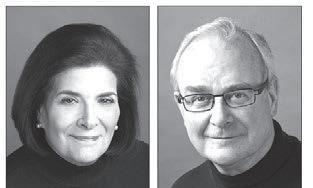

412.521.1000 EXT. 200 412.496.5600 JILL | 412.480.3110 MARK








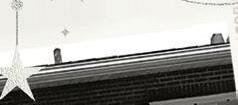









contributions of our faith communities and the important role they play in making our country a truly great Britain.”
“He





been
greater inclusivity in Orthodox Jewish life, appointing Britain’s first female halachic adviser and establishing greater opportunities for female leadership and scholarship,” the list noted. “In the field of education, the Chief Rabbi has championed the cause of faith schools and Jewish education and issued a guide on the well-being of LGBT+ pupils in Orthodox Jewish schools — the first of its kind anywhere in the world.”
CHIEF RABBI EPHRAIM MIRVISMaurice Ostro, vice president of The Council of Christians and Jews, a British volunteer group, said the honor
“underlines how the establishment has started to recognise the importance of interfaith engagement as well as the vital

Alongside Mirvis, several other British Jews received honors on the list, including Vernon Bogdanor, a noted political scientist; British Ambassador to Ukraine Melinda Simmons; television presenter Rachel Riley; Julian Lewis, a member of parliament since 1997; and Marie van der Zyl, president of the Board of Deputies of British Jews.
“This is a true honour and a great surprise. It is a tribute to all the work we do at the Board of Deputies to represent and advocate for our Jewish community,” van der Zyl said, according to the Jewish Chronicle. PJC


“I
